The Academy of Achievement brought 300 graduate students from 50 countries to Washington, D.C. for the 46th annual International Achievement Summit, June 19-23, 2007.
The American Academy of Achievement returned to Washington, D.C. for the 2007 International Achievement Summit. From June 19 to 23, nearly 300 graduate students from 50 countries gathered to learn from the experience of the world’s leading figures in the arts and sciences, sports and entertainment, business, politics and public service. Twenty-nine new honorees were inducted into the Academy, joining a constellation of returning honorees and special guests for a series of symposium sessions and panel discussions held in the most historic and inspiring locations of our nation’s capital. Members of the Academy, new and old, stayed at the elegant Hay-Adams Hotel, facing the White House across Lafayette Park.
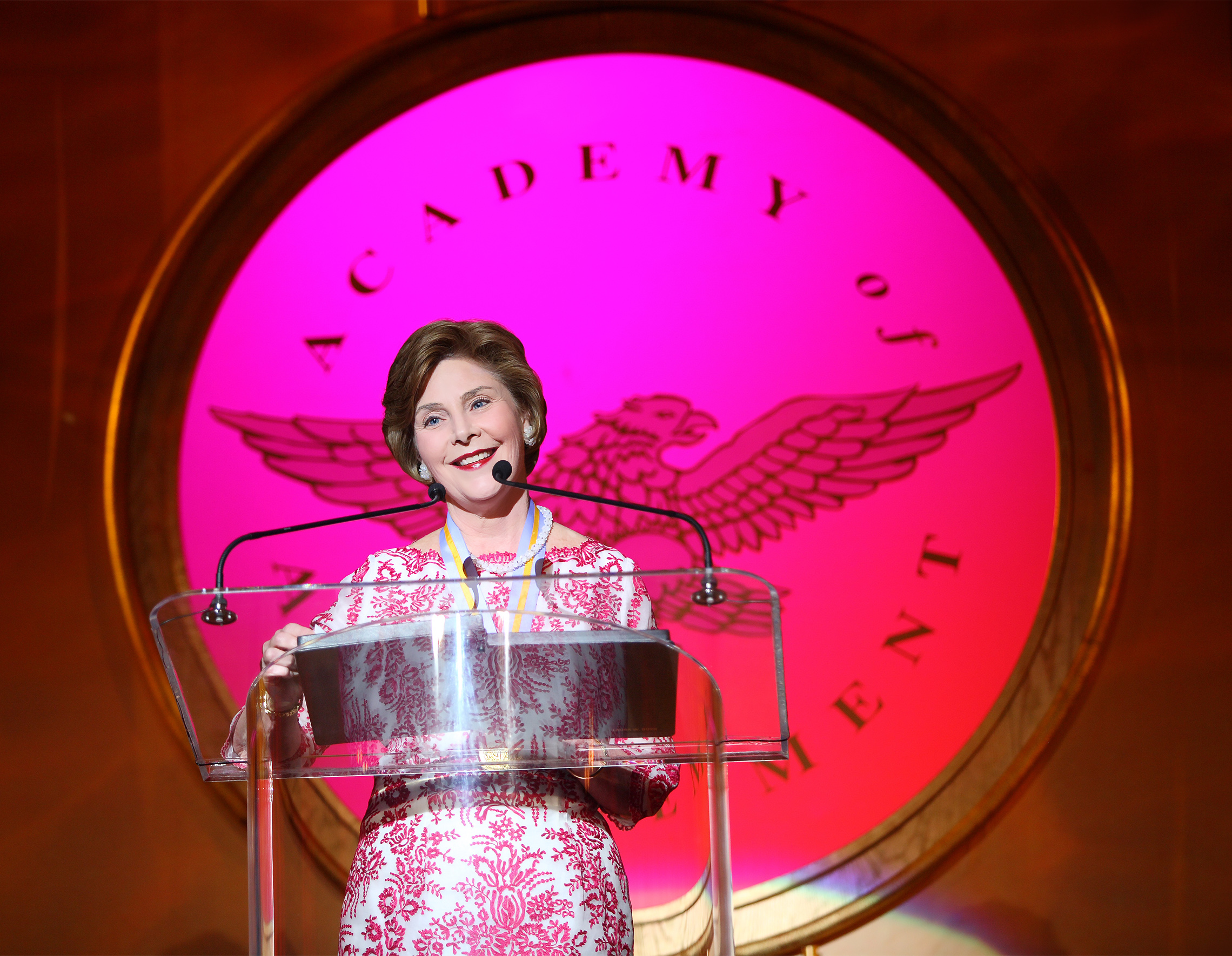
Members of the Academy and special guests attending the 2007 Summit included: the 42nd President of the United States, William J. Clinton; First Lady Laura Bush; the Chief Justice of the Supreme Court, John Roberts, and Justices Anthony M. Kennedy and Ruth Bader Ginsburg; Speaker of the House Nancy Pelosi; Senate Majority Leader Harry Reid; Senators Chuck Hagel and Barack Obama; Secretary of the Treasury Henry M. Paulson; Secretary of Defense Robert Gates; Attorney General Alberto Gonzales; CIA Director Michael V. Hayden; Deputy Secretary of State John D. Negroponte; Congressman John Lewis; the Chairman of the Joint Chiefs of Staff, General Peter Pace; former NATO Commanders Wesley Clark and Joseph Ralston; the Mayor of Chicago, Richard M. Daley; Nobel Peace Prize recipients Archbishop Desmond Tutu and Elie Wiesel; recipient of the Nobel Prize for Literature, Professor Toni Morrison; Pulitzer Prize authors Thomas Friedman, N. Scott Momaday, Suzan-Lori Parks, Dana Priest, Neil Sheehan and Lawrence Wright; Congressional Medal of Honor recipients Michael Thornton and Thomas Norris; track and field legend Sir Roger Bannister; Basketball Hall of Fame honoree Kareem Abdul-Jabbar; Super Bowl champion quarterback Peyton Manning; Olympic Gold Medalists Andre Agassi and Dorothy Hamill; two-time Best Actress Oscar recipient Hilary Swank; filmmaker George Lucas; best-selling author Calvin Trillin; and country music sensations Brooks and Dunn.
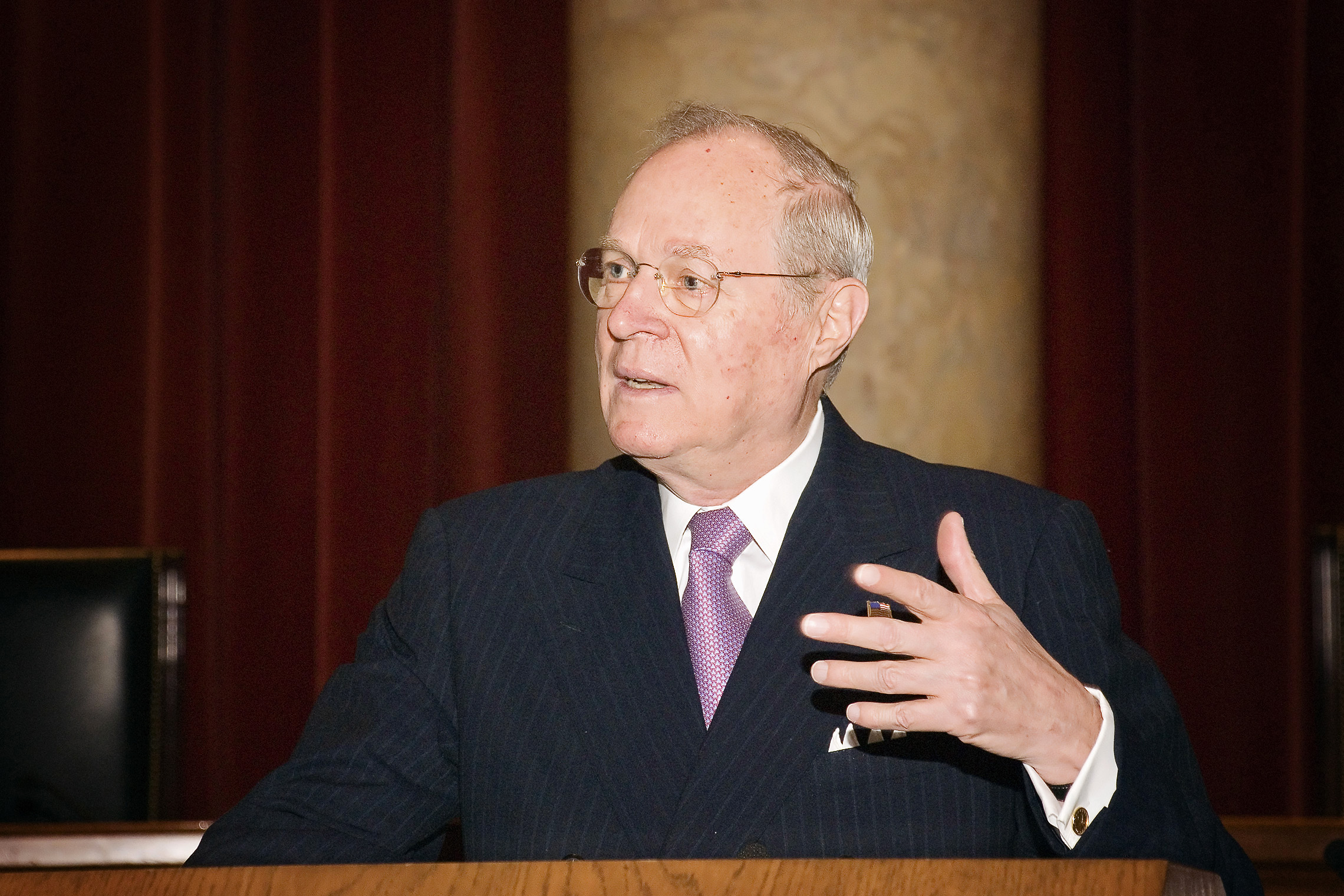
The Host Chairman of the 2007 Summit was Catherine B. Reynolds, Chairman and CEO of The Catherine B. Reynolds Foundation. The Summit was made possible by a generous grant from The Catherine B. Reynolds Foundation.
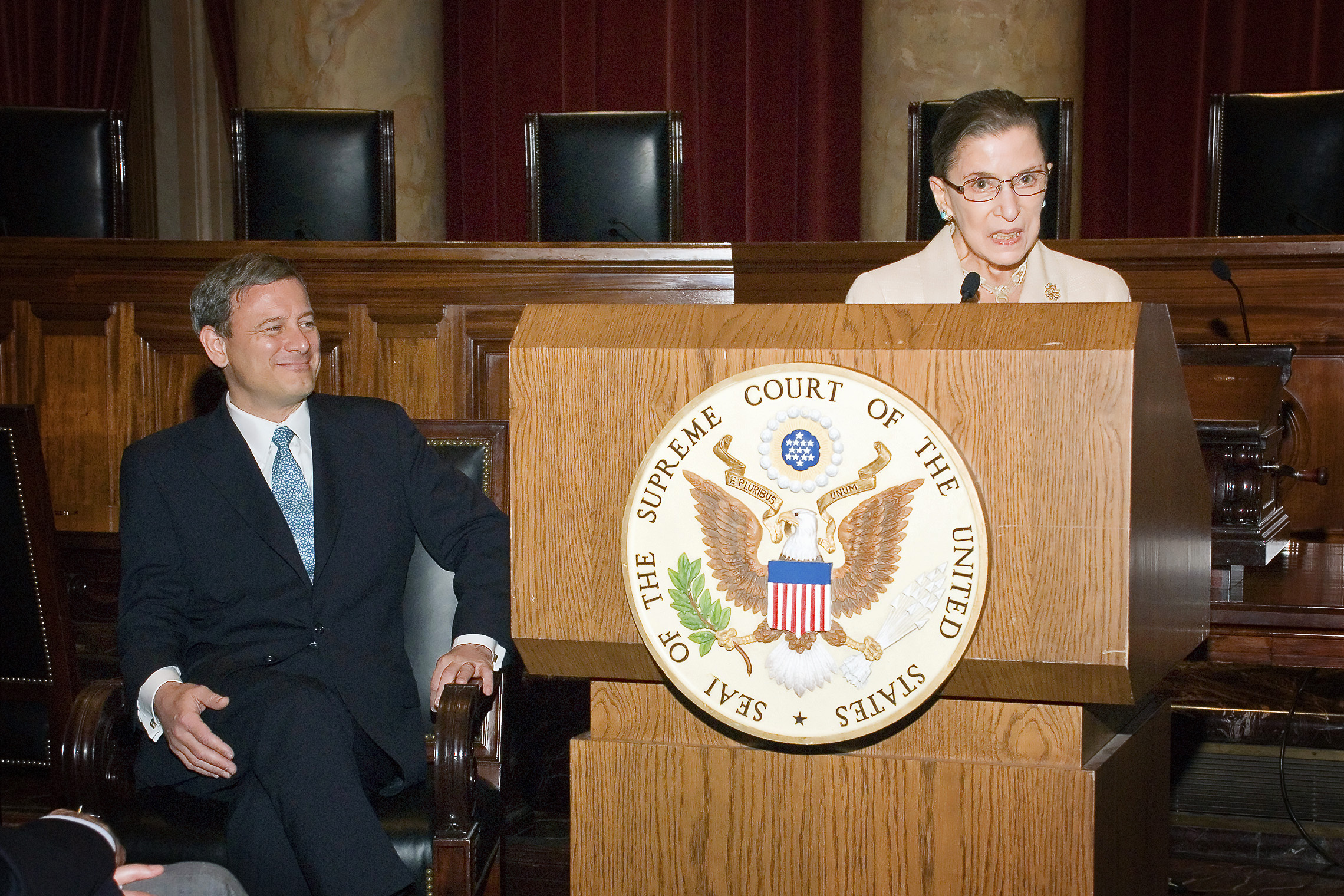
The week’s events opened on a characteristically dramatic note on Tuesday, June 19, with an evening at the United States Supreme Court. The Academy’s student delegates, many of whom had only arrived from overseas an hour or two earlier, were transported to the Court by motorcade with police escort. On arrival, they were received in the Courtroom by Chief Justice John Roberts, along with his colleagues, Justice Anthony M. Kennedy and Ruth Bader Ginsburg, both members of the Academy’s Awards Council. In the informal discussion that followed, the Justices surprised many of the students, not only with their warmth and good humor, but with their spirit of collegiality. Far from presenting the image of a court divided into opposing camps, the Justices emphasized their common commitment to the Constitution and to the pursuit of impartial justice.
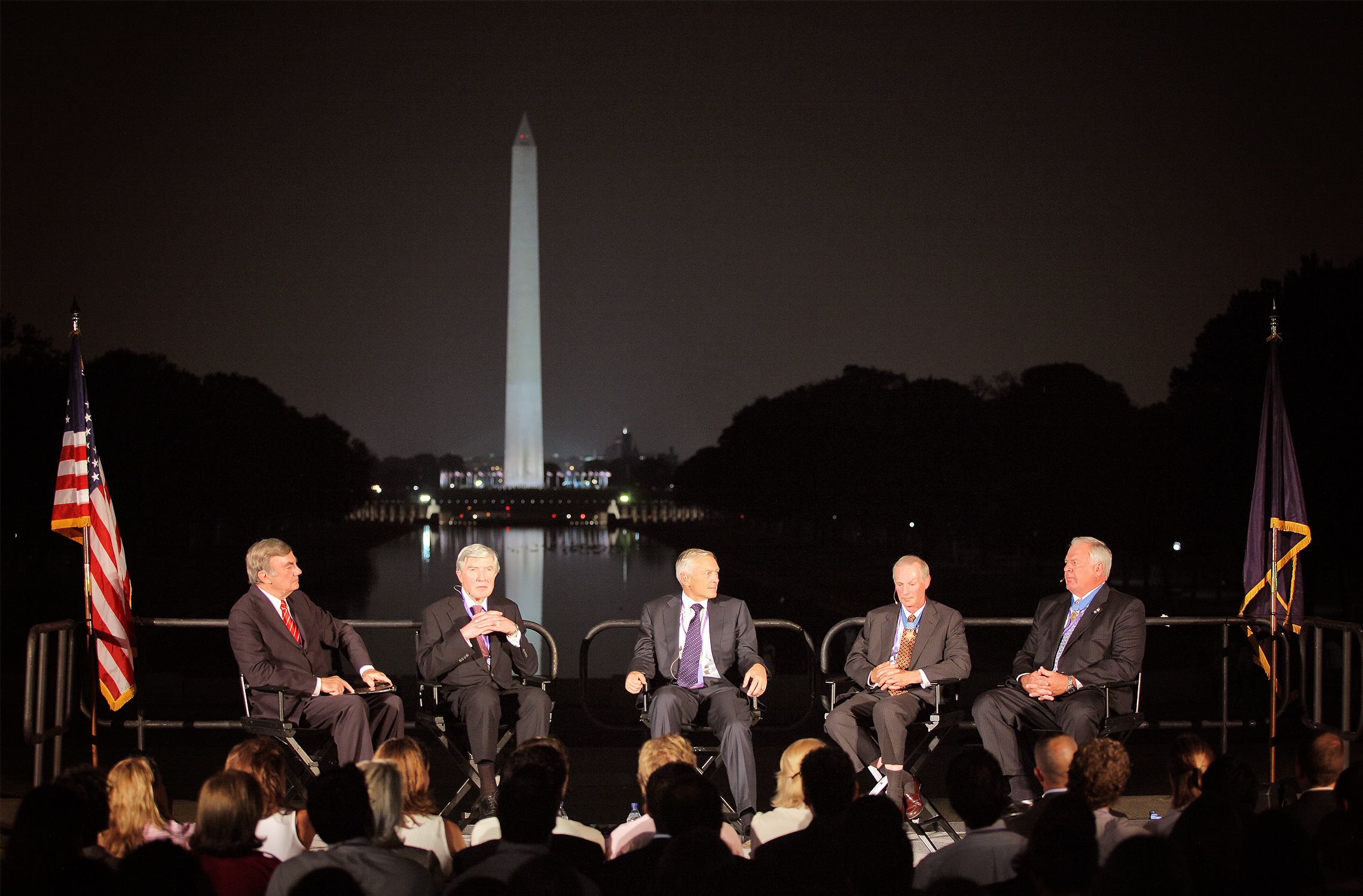
Immediately after their question-and-answer session with the Justices, the student delegates were treated to an elegant dinner in the majestic Great Hall of the Court. Before returning to their hotel for the evening, the students took a tour of the Vietnam Veterans Memorial and the Lincoln Memorial. At the Lincoln Memorial, they took part in an unusual discussion of the Vietnam War and its relevance to the war in Iraq, moderated by veteran broadcaster Sam Donaldson. The panel’s participants were the renowned Vietnam War correspondent Neil Sheehan, along with three veterans of that conflict: General Wesley Clark, and Medal of Honor winners Michael Thornton and Thomas Norris.
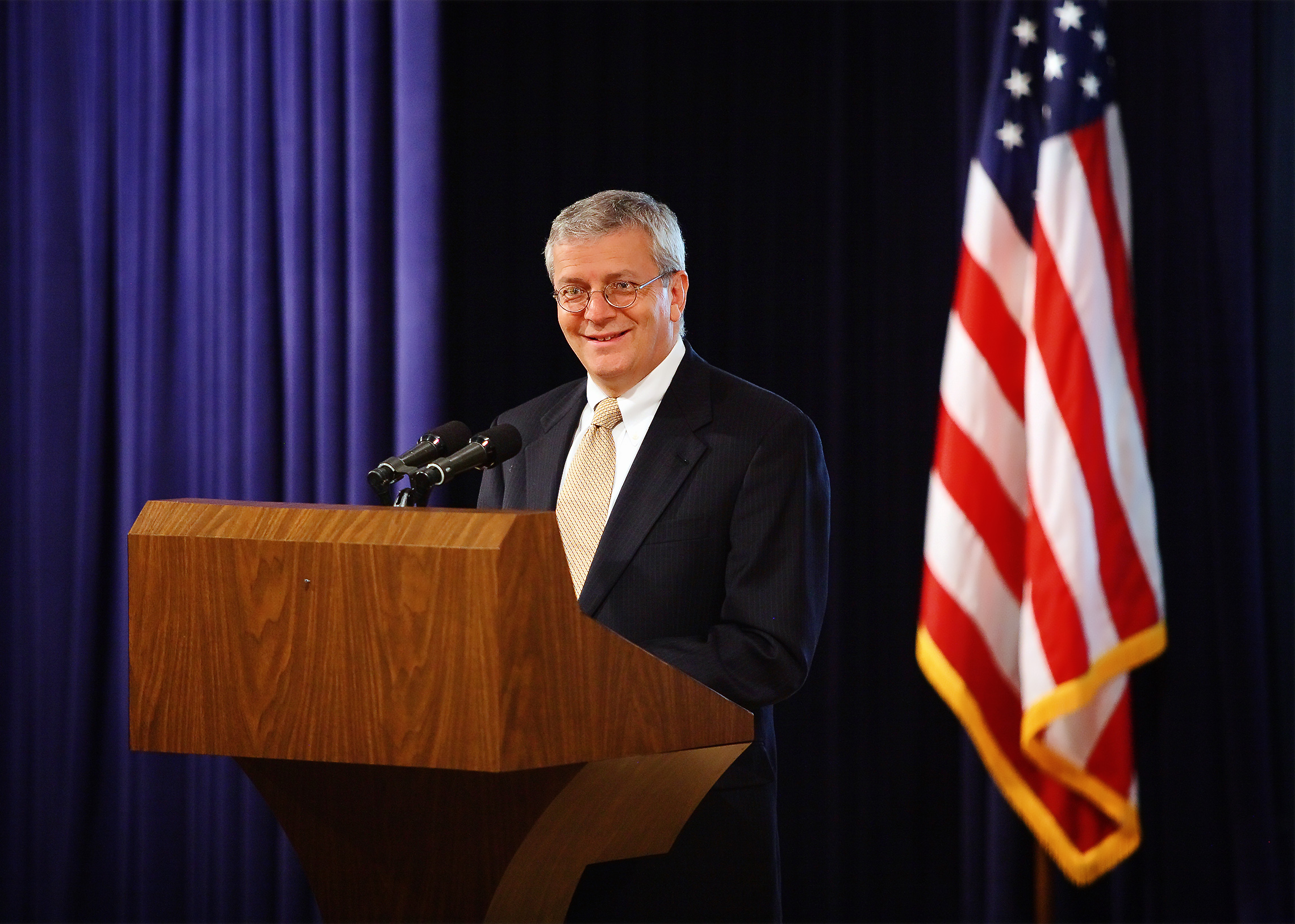
The following morning, the student delegates took a tour of the National Archives, where they saw the famous Charters of Freedom: original copies of the Declaration of Independence, the Constitution and the Bill of Rights. In the Archives’ state-of-the-art MacGowan Theater, they heard from a number of distinguished Academy members, including the acclaimed author of Memoirs of a Geisha, Arthur Golden; David Rubenstein, the founder of private equity giant The Carlyle Group; consumer advocate Ralph Nader; and Dr. Ian Frazer, creator of the human papilloma virus vaccine, the first vaccine to offer immunity against a specific form of cancer.

In the afternoon, a large contingent of student delegates continued their exploration of the frontiers of medicine, traveling to the sprawling campus of the National Institutes of Health (NIH) in nearby Bethesda, Maryland. There, they met with some of the distinguished Academy members from the medical sciences: the Director of NIH, Dr. Elias Zerhouni; Dr. Francis Collins, the Director of the National Human Genome Project; the Director of the National Institute of Allergy and Infectious Diseases, Dr. Anthony Fauci; and Dr. Steven Rosenberg, the Director of the National Cancer Institute. Students also met with a number of the Institute’s patients — men and women whose illness had not responded to conventional treatment but are now recovering and resuming normal lives through Dr. Rosenberg’s revolutionary immuno-therapy. Dr. Rosenberg and his colleagues urged the Academy’s student delegates, many of them medical scientists themselves, to continue exploring the unsolved mysteries of health and disease. Dr. Zerhouni recalled the feelings that led to his own breakthroughs in medical imaging: “Let me find a better way.”
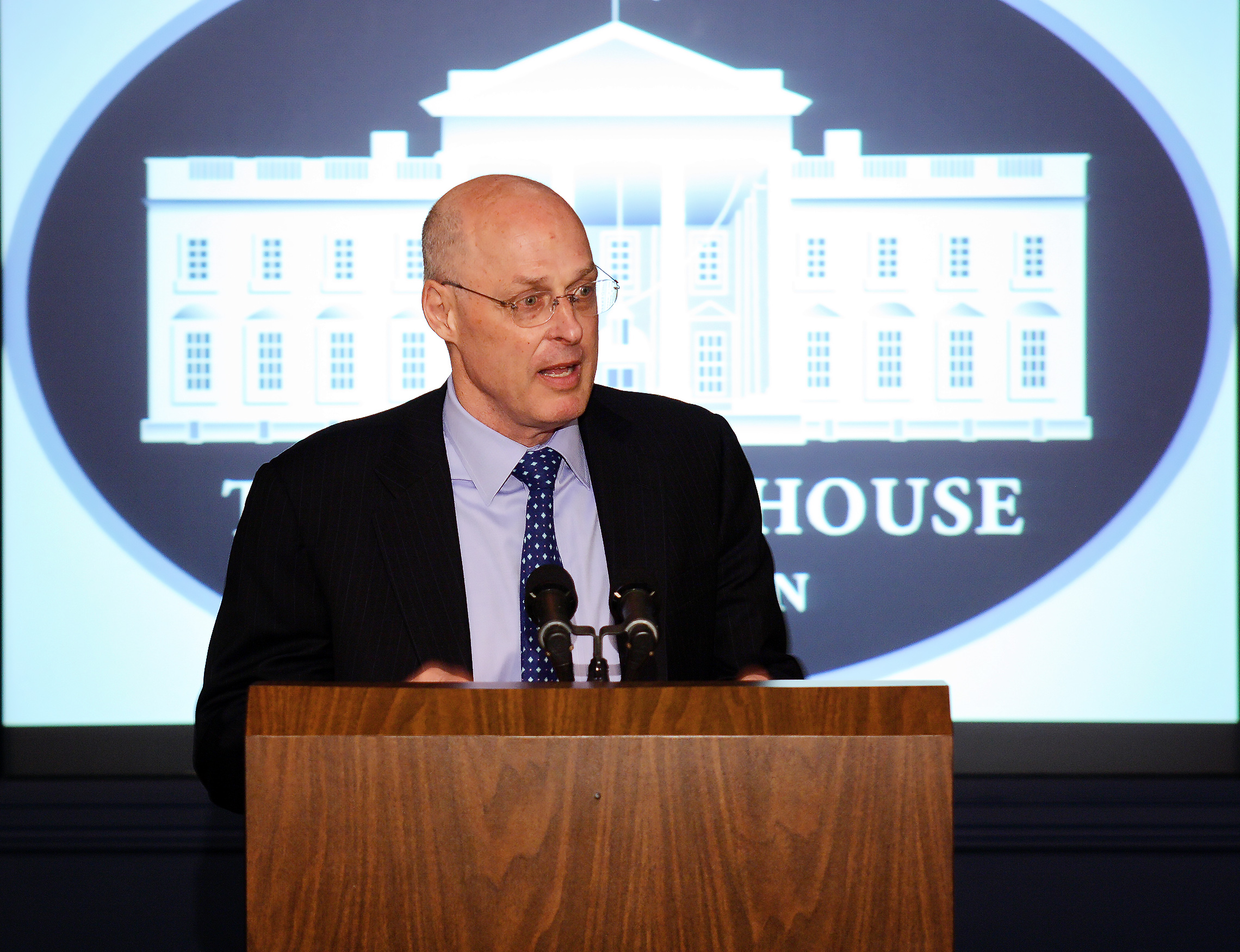
That same afternoon, another contingent of Academy student delegates was taken for a rare behind-the-scenes visit to the Eisenhower Executive Office Building, where much of the work of the White House staff is done. In Room 450, the familiar setting of televised press briefings, the students heard candid off-the-record remarks from the White House Chief of Staff, Josh Bolten, and from Deputy Chief of Staff Karl Rove, who surprised many of the students with his self-effacing good humor in the uninhibited give-and-take of a long question-and-answer session. Two new Academy members from the upper reaches of government also spoke with the Academy’s students: the top-ranking officer in the United States military, Chairman of the Joint Chiefs of Staff, General Peter Pace; and Treasury Secretary Henry M. Paulson, who not only discussed his role as the federal government’s chief financial officer, but his previous career as Chairman of the banking house Goldman Sachs, and as head of the world’s largest environmental organization, The Nature Conservancy.
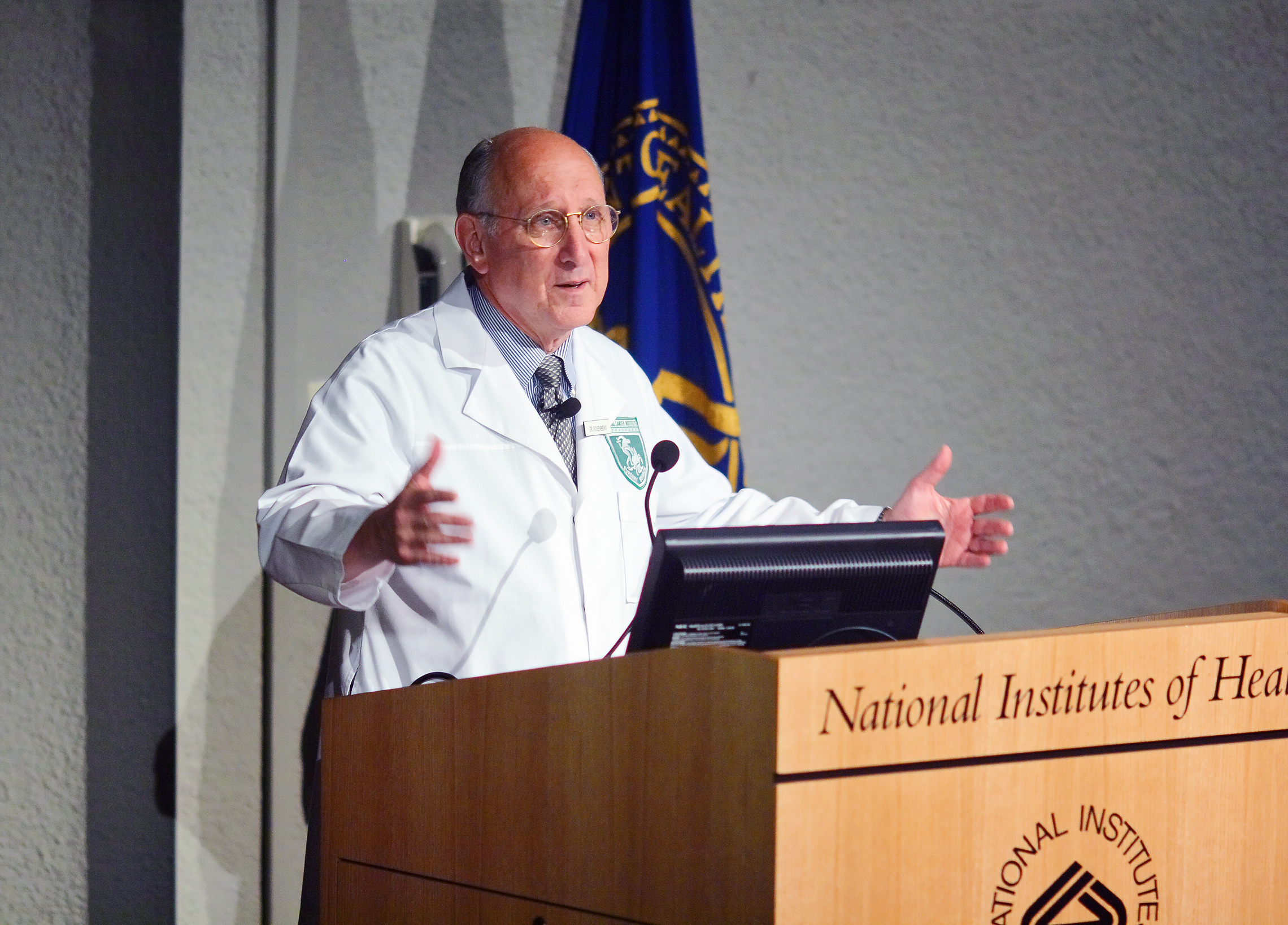
From the Eisenhower Executive Office Building, student delegates traveled to the Department of Justice, where they were met by Attorney General Alberto Gonzales and other top-ranking officials, including the FBI’s Assistant Director for Counterterrorism, Joseph Billy, Jr., and the federal government’s chief litigator, Solicitor General Paul Clement.
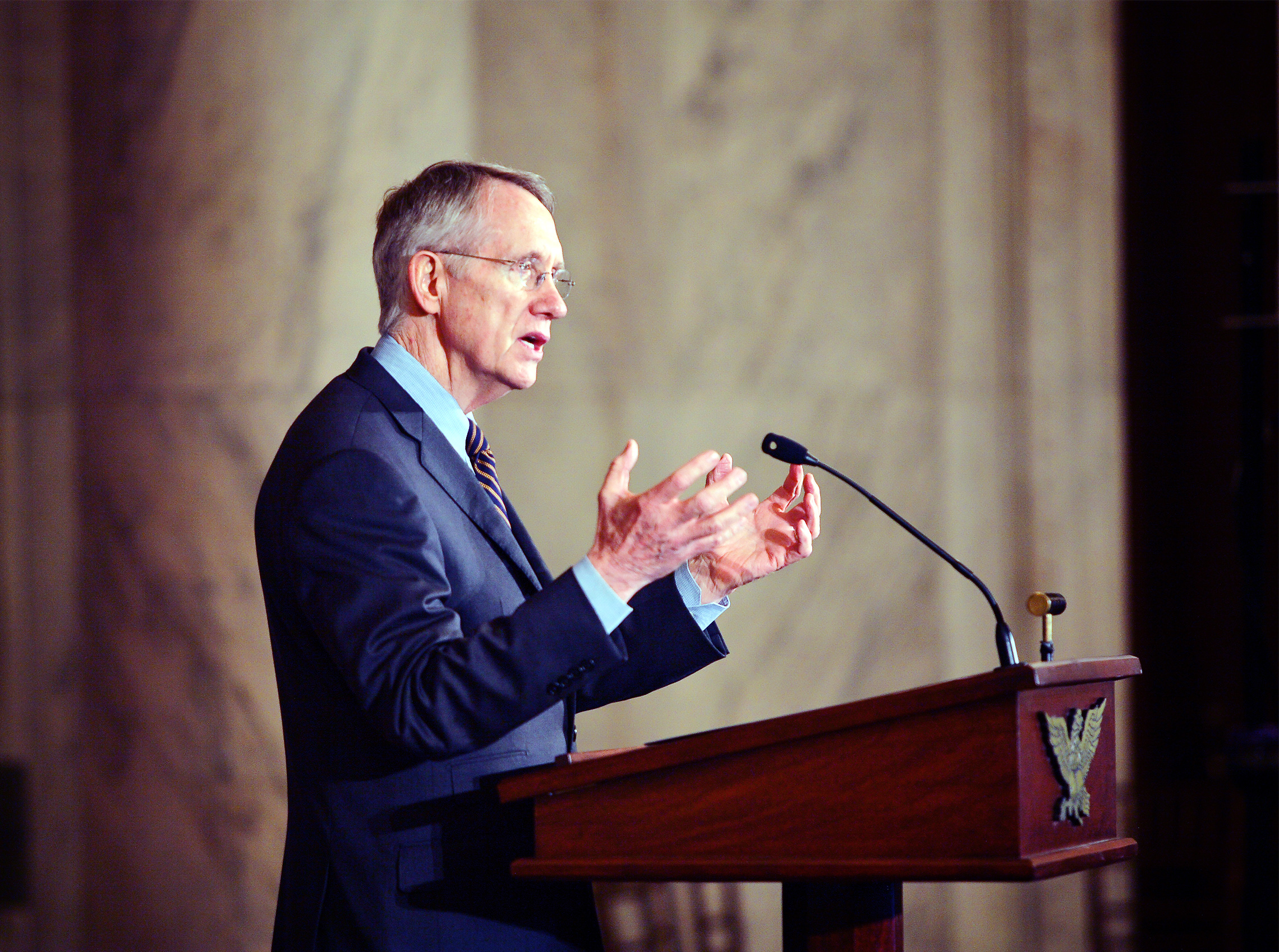
That evening, all of the Academy’s student delegates visited the Caucus Room of the Russell Senate Office Building. Amidst the high, coffered ceiling and imposing columns of this room, where so many historic Senate hearings have taken place, they heard from the ranking member of the upper house, Majority Leader Harry Reid. The excitement rose with the arrival of the charismatic Senator from Illinois, Barack Obama, who paid gracious tribute to Academy member Desmond Tutu, a hero of the struggle against apartheid in South Africa. Senator Chuck Hagel of Nebraska charmed the students with his down-to-earth manner and self-deprecating humor. All three Senators were inducted into the Academy of Achievement by Archbishop Tutu. Following their evening at the Russell Building, the students were taken to the Hall of Flags at the United States Chamber of Commerce for a dinner with the many members of the Academy who had arrived in Washington throughout the day. During the evening, student delegates Michelle Branch and Jessica Harp, also known as the Wreckers, performed a set of songs from their Grammy-nominated debut album.
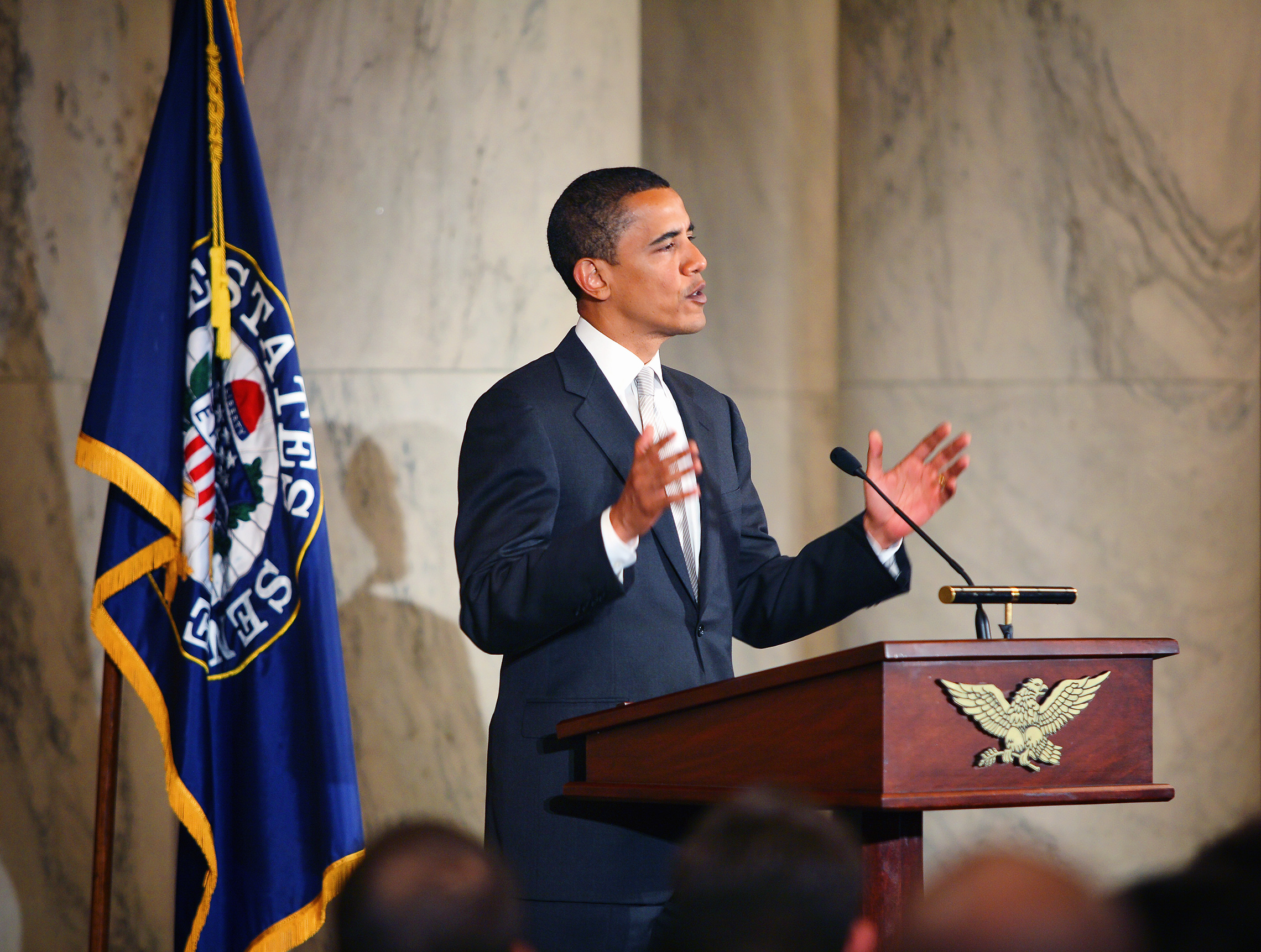
Thursday morning, the entire assemblage of Academy members and student delegates traveled to the State Department, where Academy members conducted a fascinating symposium on world affairs. A. Scott Berg, a past recipient of the Pulitzer Prize for Biography, discussed his research for an upcoming book on President Woodrow Wilson, architect of the United States’ leading role in international affairs. Legendary investigative journalist Bob Woodward discussed the war in Iraq and the leadership of President Bush. Lawrence Wright, recipient of the Pulitzer Prize for his book on the terrorist group Al Qaeda, discussed his adventures as an investigative reporter in the Middle East. Washington Post reporter Dana Priest, who was also honored with a Pulitzer for investigative reporting, discussed her exposés of CIA secret prisons, controversial methods of interrogation, and unacceptable conditions in the outpatient facilities at Walter Reed Army Medical Center.
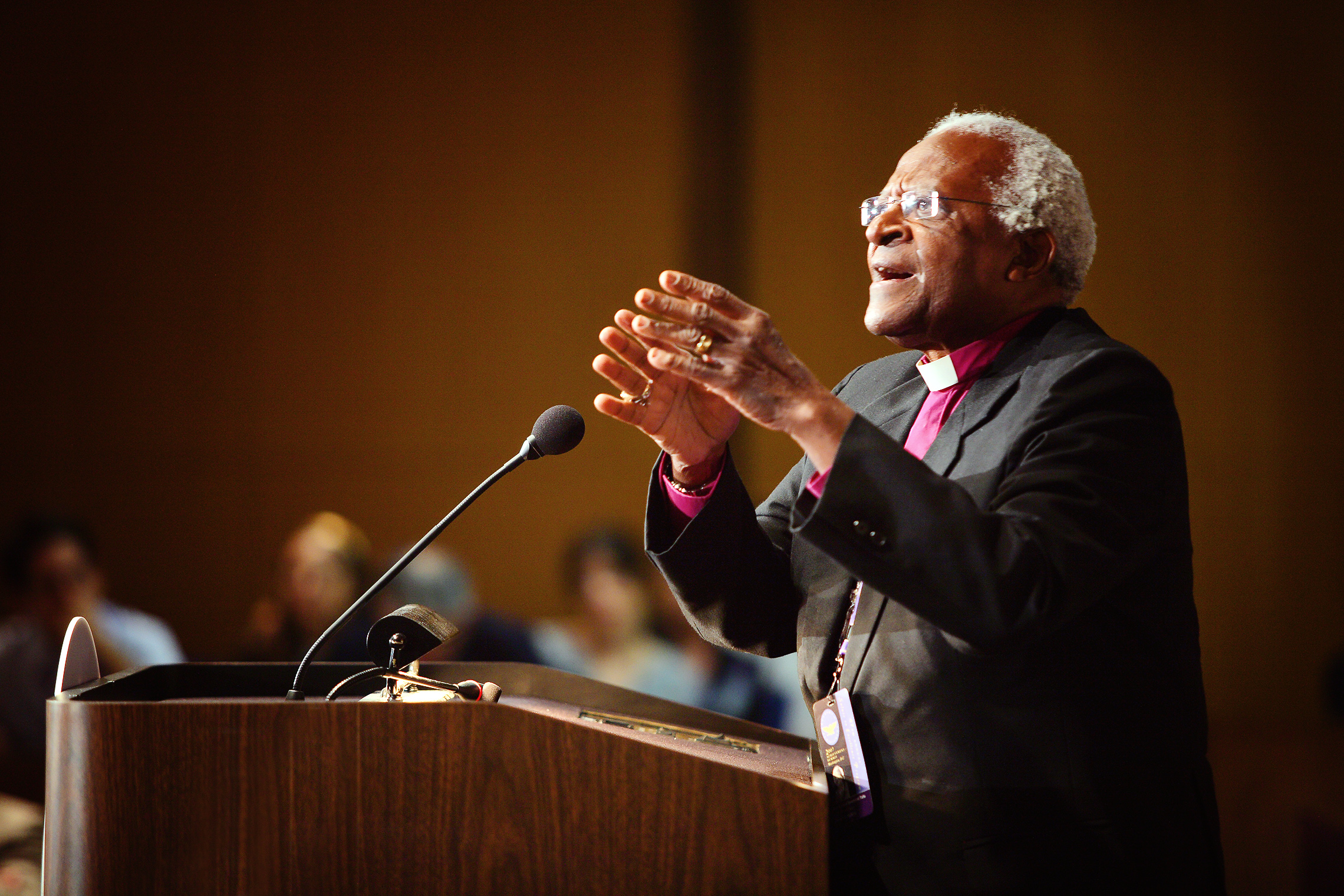
One of the most inspiring addresses of the week came from Archbishop Desmond Tutu. The Archbishop filled the hall with laughter when he presented the Biblical story of the Annunciation in the form of a knock-knock joke, before making a more profound point about the universal call to serve a cause larger than ourselves. The assembly enjoyed luncheon that day in the diplomatic reception rooms of the State Department, with their priceless collections of historic artifacts.

The afternoon session resumed at the Chamber of Commerce, with Academy member Dr. Benjamin Carson discussing his odyssey from the ghetto to the operating theater, where he has performed groundbreaking surgeries on the human brain. Scientific presentations during the Summit ranged from the cosmic to the microscopic. Astrophysicist Dr. John Mather demonstrated his Nobel Prize-winning discoveries concerning the microwave background radiation of the universe. Later in the Summit, Dr. Craig Mello made a breathtaking animated presentation of his discovery of RNAi, the “interfering” protein that regulates many phenomena of heredity and immunity.

A panel discussion on social entrepreneurship, led by former presidential advisor David Gergen, featured Academy member Wendy Kopp, the founder of Teach for America, along with special guests Mike Feinberg, Kirsten Lodal, Jon Schnur and Billy Shore, who have all founded nonprofit organizations to provide quality education to disadvantaged youth.

Pulitzer Prize-winning playwright Suzan-Lori Parks delighted the audience with her effervescent personality, while making a more serious point, that public recognition of any professional accomplishment imposes a greater responsibility to society. Later in the Summit, the novelist and poet N. Scott Momaday also made a memorable appearance, telling three Native American tales — legends and fables that illustrate the unique viewpoint of his ancestral culture. Thursday afternoon’s program concluded with a bracingly witty address from the bestselling author and filmmaker Nora Ephron.
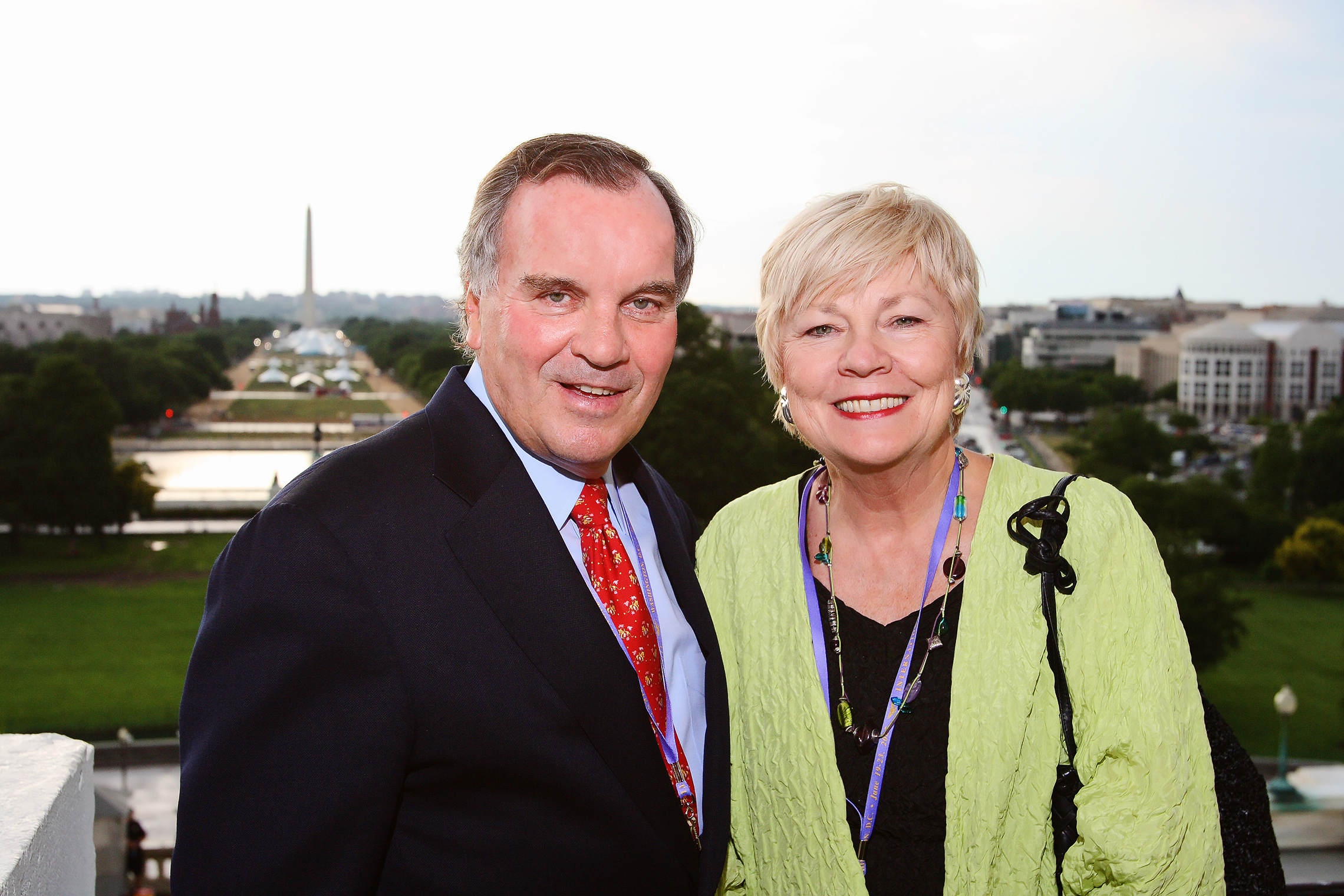
More remarkable experiences awaited the Summit participants. On Thursday evening, the student delegates were taken for a private tour of the United States Capitol, ending with a dinner in the Capitol’s famed Statuary Hall. The entire assembly of students and Academy members traveled from the Capitol to the Cannon House Office Building through the underground passage used by members of Congress. At the Cannon Building, they heard from three exceptionally distinguished members of the Academy. First, they were welcomed by the Speaker of the House, Nancy J. Pelosi. Congressman John R. Lewis, a hero of the 1960s Civil Rights movement, made an impassioned and inspiring address. Congressman Lewis reminded the Academy’s students of what the movement had accomplished without the aid of cell phones, the Internet, or any of the other communications technology that are now considered so essential to political activism.
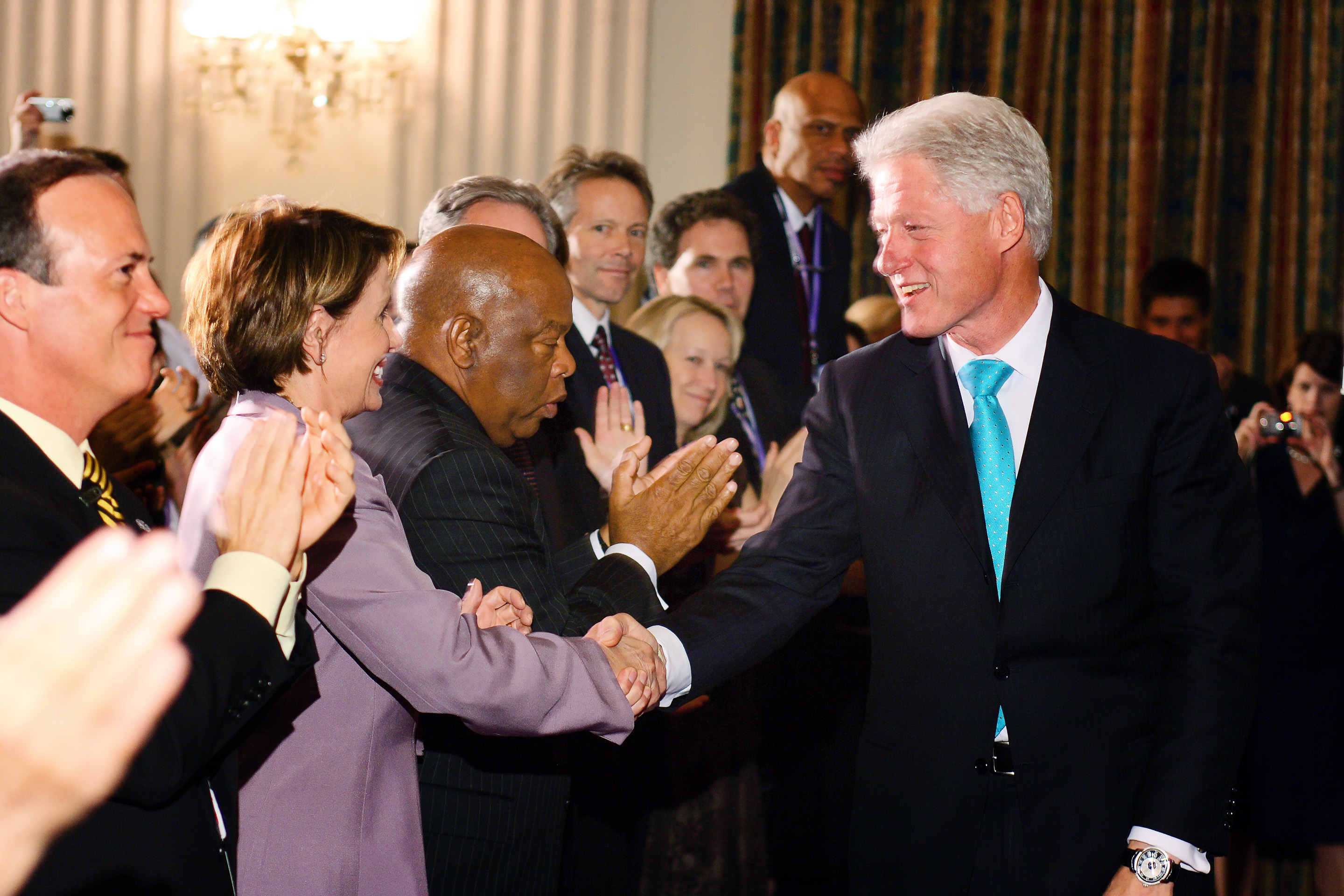
The unmistakable high point of the evening came with the arrival of the 42nd President of the United States, William J. Clinton. President Clinton spoke at length, touching on a vast range of issues, from Iraq to global warming. He asserted that solutions to a wide range of problems, from health insurance to the conflict between Israel and Palestine, are already within reach. The outlines of successful compromise are well known to policy makers, he insisted; all that remains is the political will to effect them. That impetus, he emphasized, will not come from elected political leaders. It must come from civil society and the people themselves.
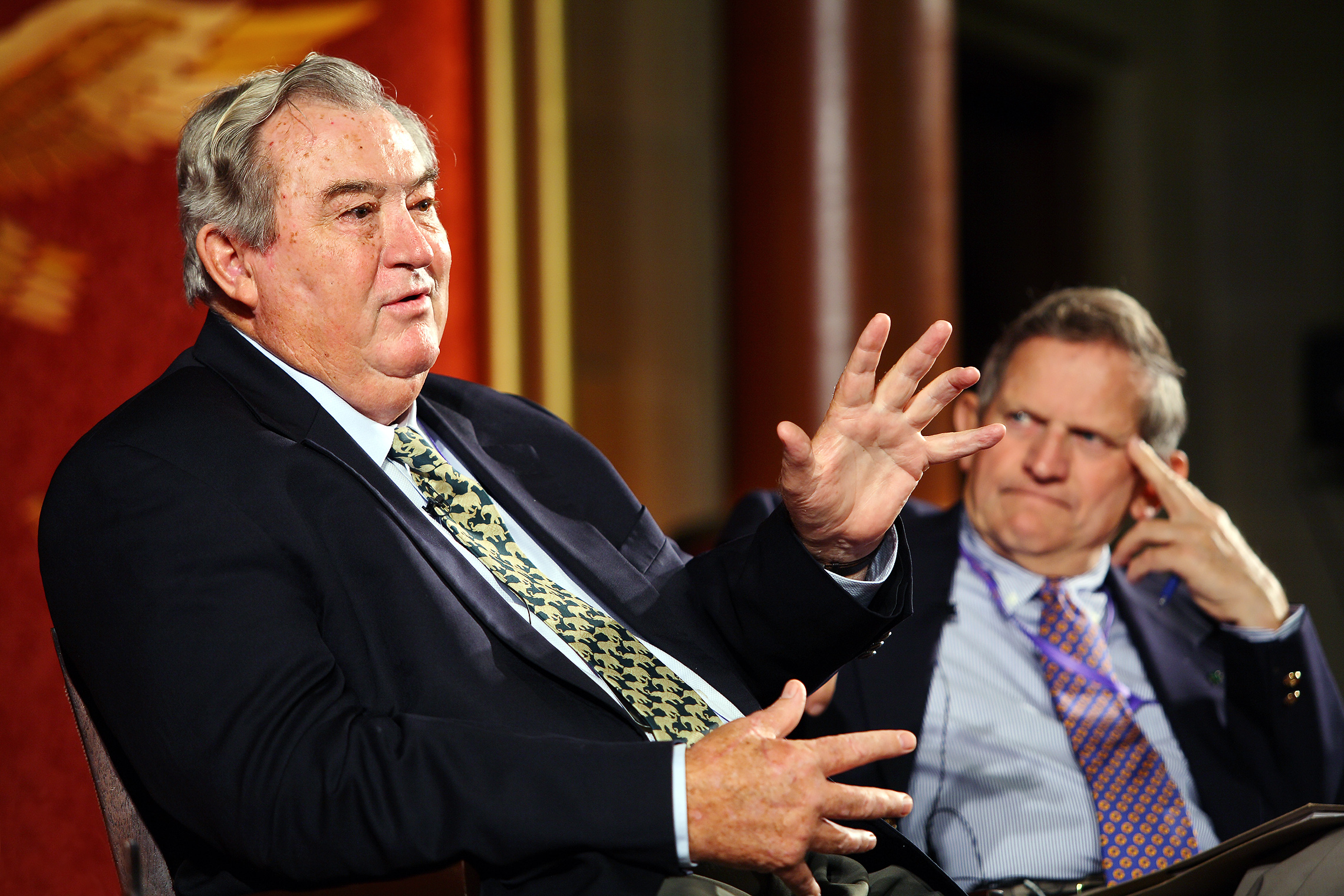
The former president happily took challenging questions from the student delegates, supplying thorough, detailed answers to every question. In his most emphatic point, President Clinton noted that all human beings share more than 99 percent of their DNA. Like the Supreme Court Justices and the U.S. Senators who spoke earlier in the week — and like Desmond Tutu, who spoke that morning — President Clinton emphasized the need to concentrate on the universal aspirations that unite us all, rather than the relatively trivial differences that divide us.
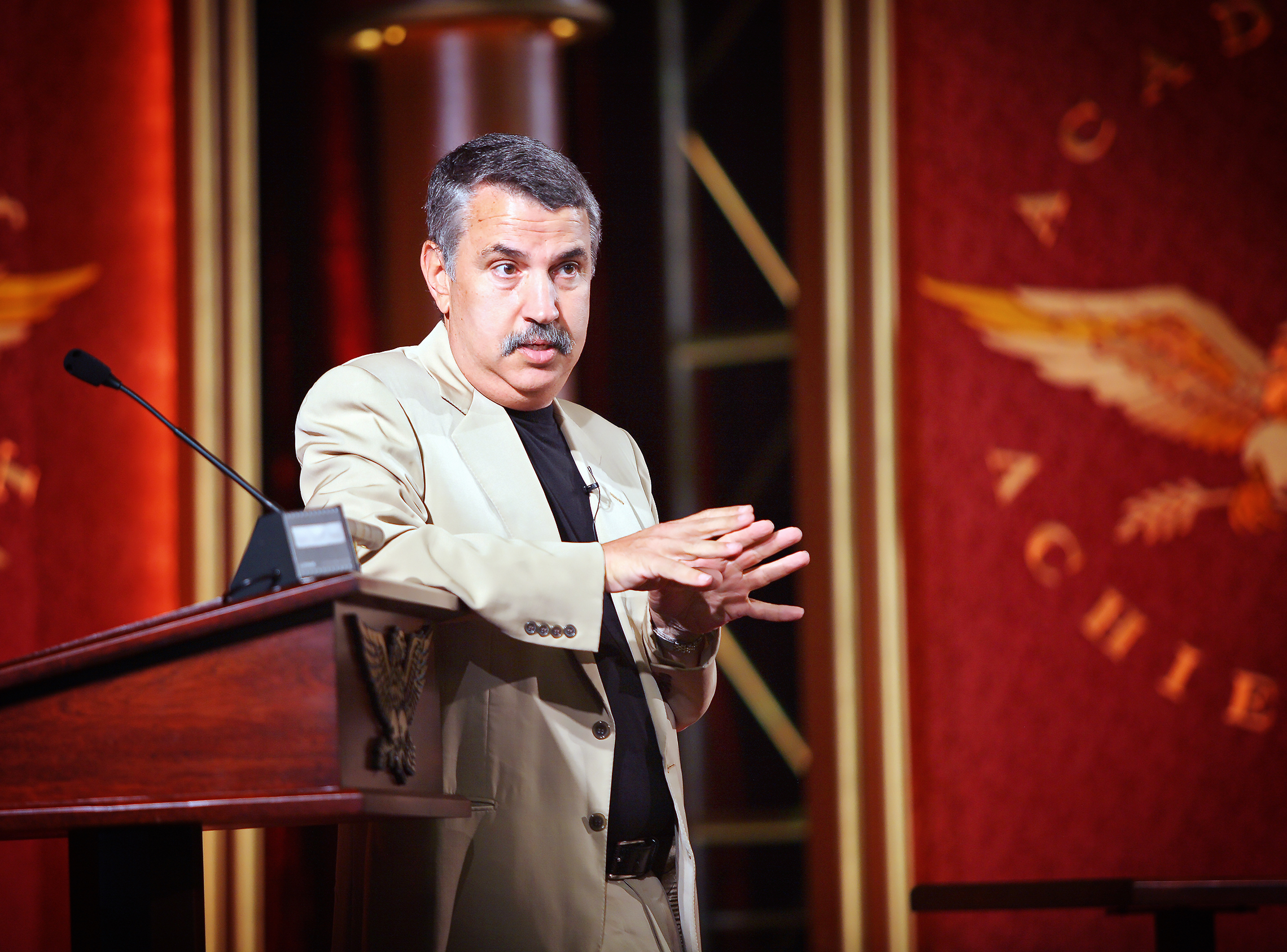
Friday morning’s session at the Chamber of Commerce opened with a good friend of the Academy, Congressman Ed Markey, one of the House’s established leaders on environmental issues. The Congressman led an informative discussion of Global Warming and the Environment with a distinguished panel of Academy members: marine biologist Sylvia Earle; paleoanthropologist and conservationist Richard Leakey; and John Morgridge, the business leader responsible for the success of Cisco Systems, who is now Chairman of The Nature Conservancy.
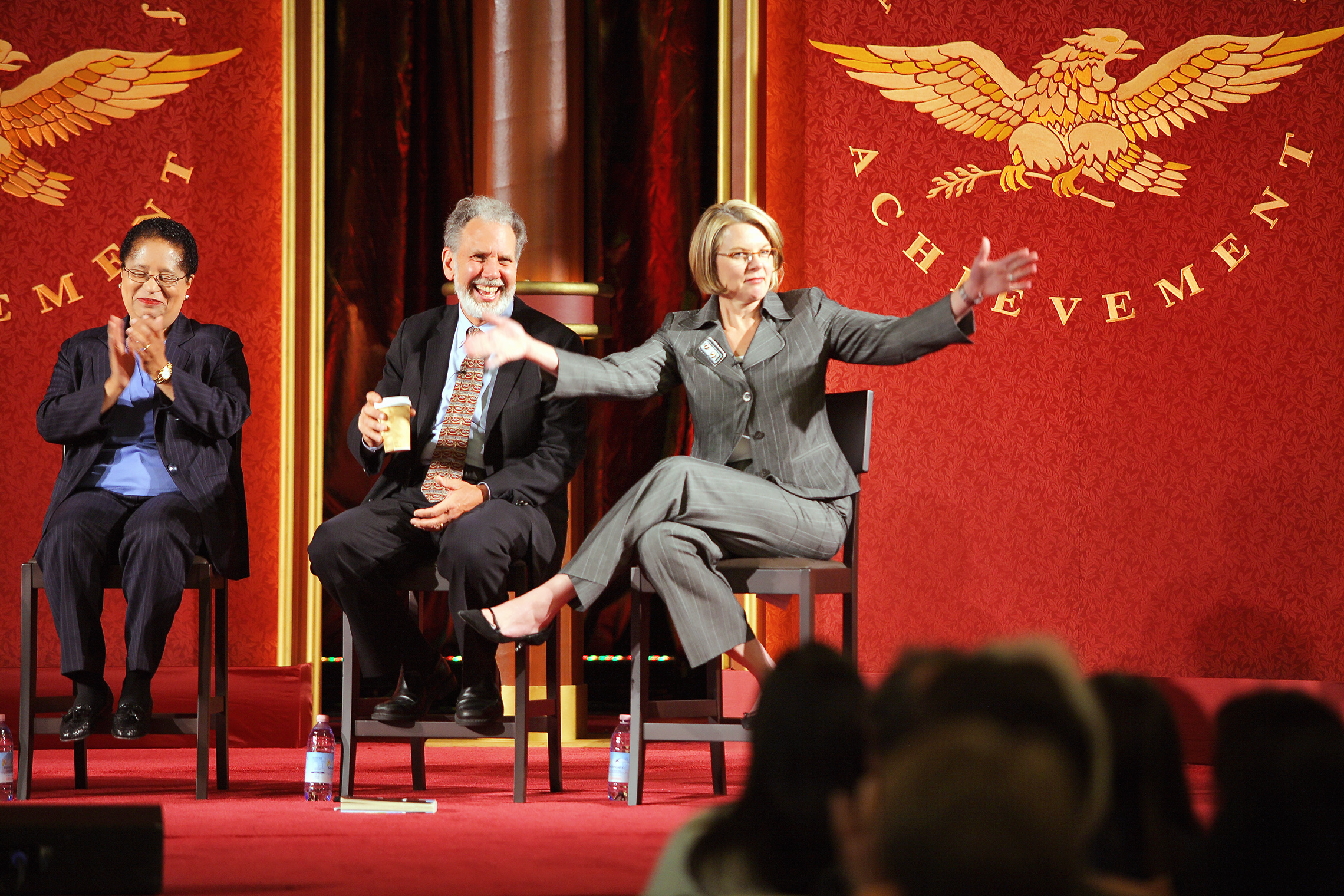
Famed journalist Thomas Friedman, the recipient of multiple Pulitzer Prizes, addressed a number of topics in a wide-ranging conversation, but concentrated on the climate crisis and related environmental issues. Author Calvin Trillin followed with a deadpan recitation of his own career as a journalist and creative writer that had the audience of 500 dissolving in laughter while he retained his eternally dry, unflappable composure.
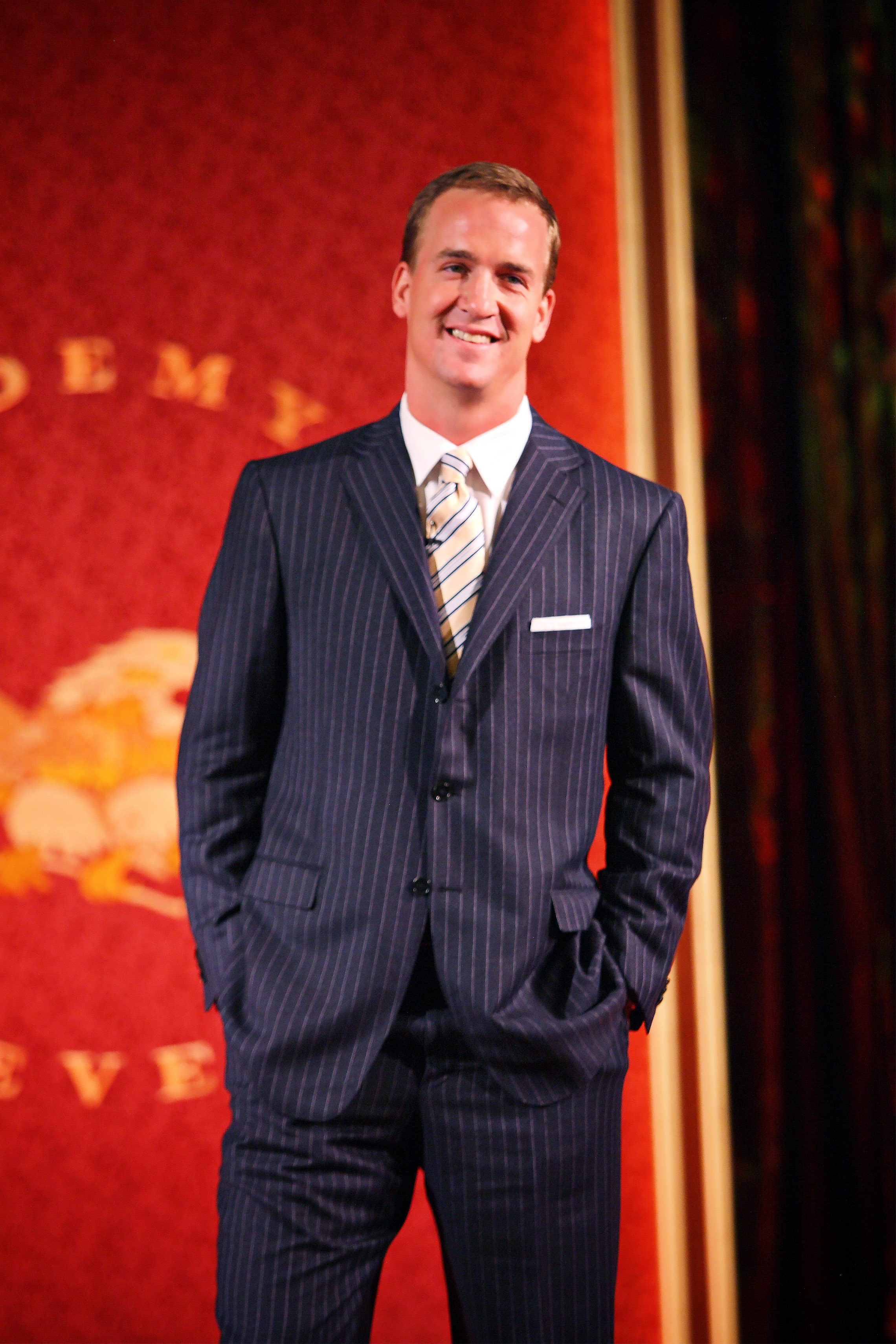
Financier and philanthropist Mike Milken discussed his path to success in business and his prodigious charitable ventures. Legendary filmmaker George Lucas recalled the persistence that enabled him to succeed in a competitive field, while emphasizing the responsibility of men and women in all walks of life to serve a calling higher than mere self-interest.
The student delegates were surprised by the arrival of Hilary Swank, the compelling star of such films as Boys Don’t Cry and Million Dollar Baby, roles that earned her two Oscars as Best Actress. In an utterly unpretentious and candid address, she discussed her grueling physical preparation for these demanding roles. Nothing worthwhile can be accomplished without complete dedication, she affirmed, and no award or other form of public recognition can take the place of the satisfaction that comes from continually meeting fresh challenges. The morning’s session ended with a deeply moving appearance by Elie Wiesel, recipient of the Nobel Peace Prize. Speaking in hushed tones, Wiesel held the audience spellbound as he described how the murder of his family, and his own experience in the concentration camps of World War II, inspired him to travel the world as a journalist, author and witness, exposing injustice wherever it arises.

During a luncheon session, two pioneers of human stem cell research, Dr. James Thomson and Dr. John Gearhart, gave an intimate presentation of their research to a select group of the Academy’s student delegates in the medical sciences. That afternoon’s program began with an exceptional discussion of education policy, moderated by David Gergen.
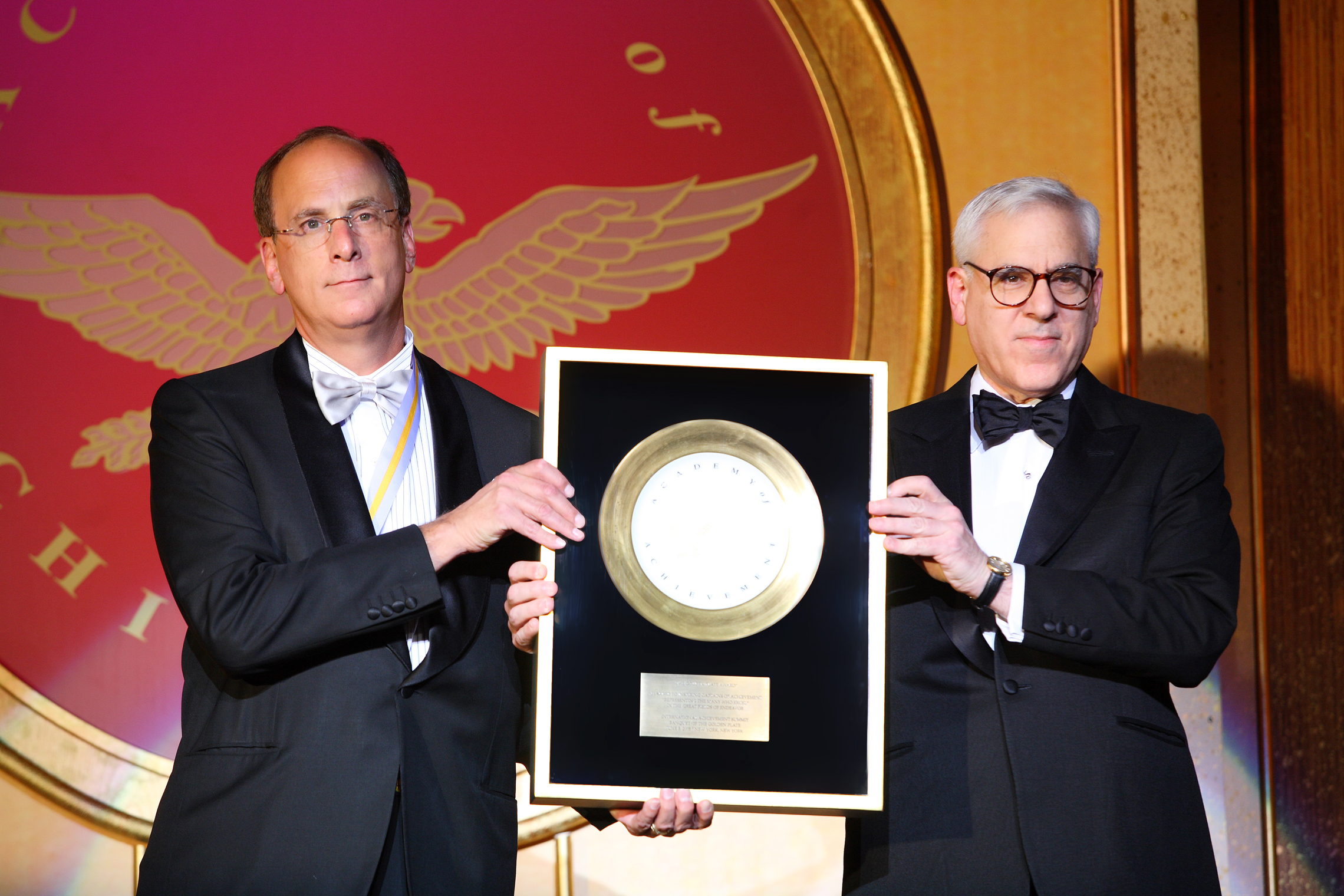
The Academy members who formed the panel are among the nation’s most distinguished leaders in the fields of education policy: the Secretary of Education, Margaret Spellings; Chicago Mayor and education reformer Richard M. Daley; New York University President John Sexton; MIT President Susan Hockfield; and physicist Shirley Ann Jackson, the President of Rensselaer Polytechnic Institute.
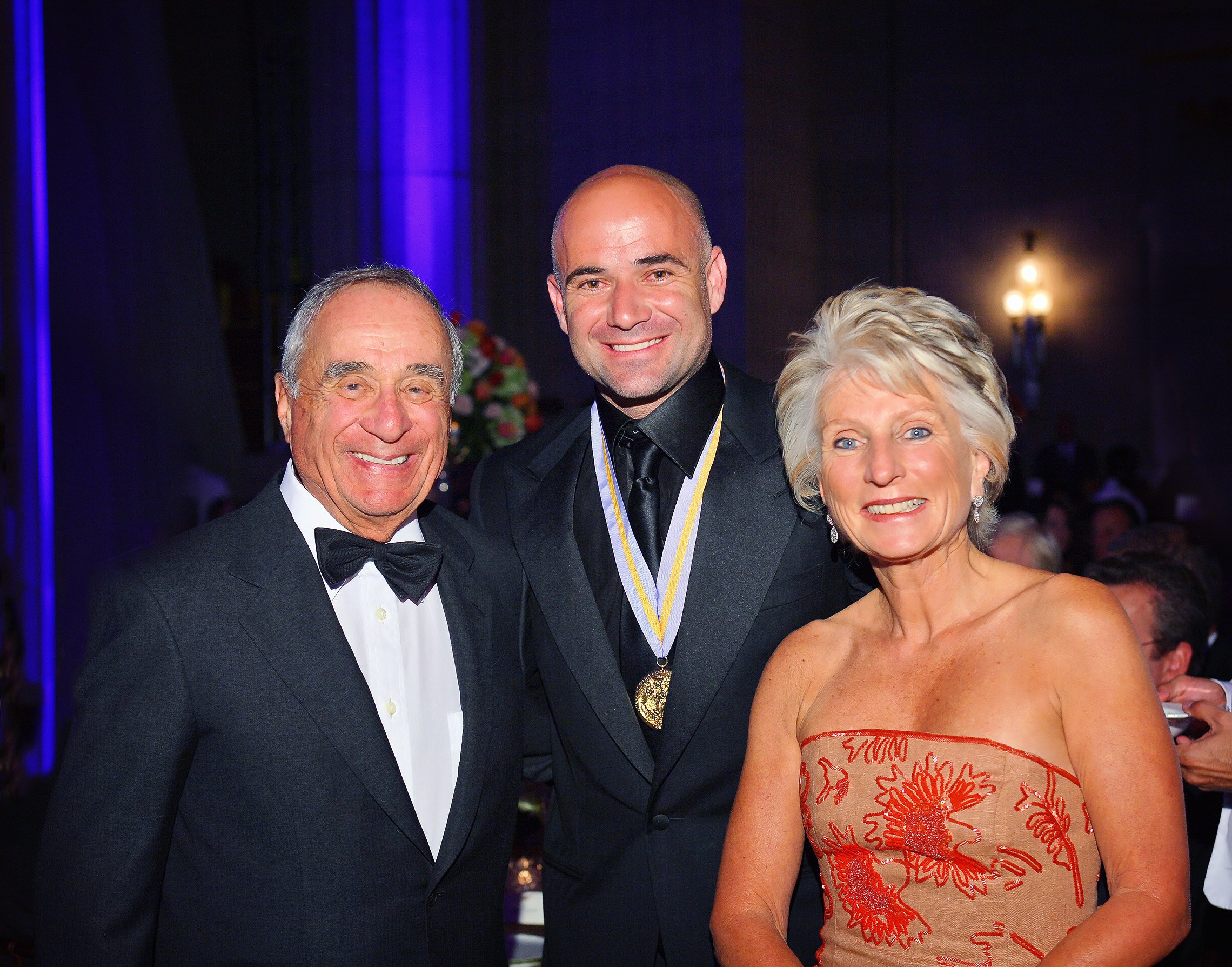
The final speakers of the afternoon were some of the most distinguished athletes and artists the United States has produced, beginning with basketball legend Kareem Abdul-Jabbar and tennis champion Andre Agassi. The only living American recipient of the Nobel Prize for Literature, Professor Toni Morrison, made an eloquent address and received an enthusiastic reception from the student delegates.
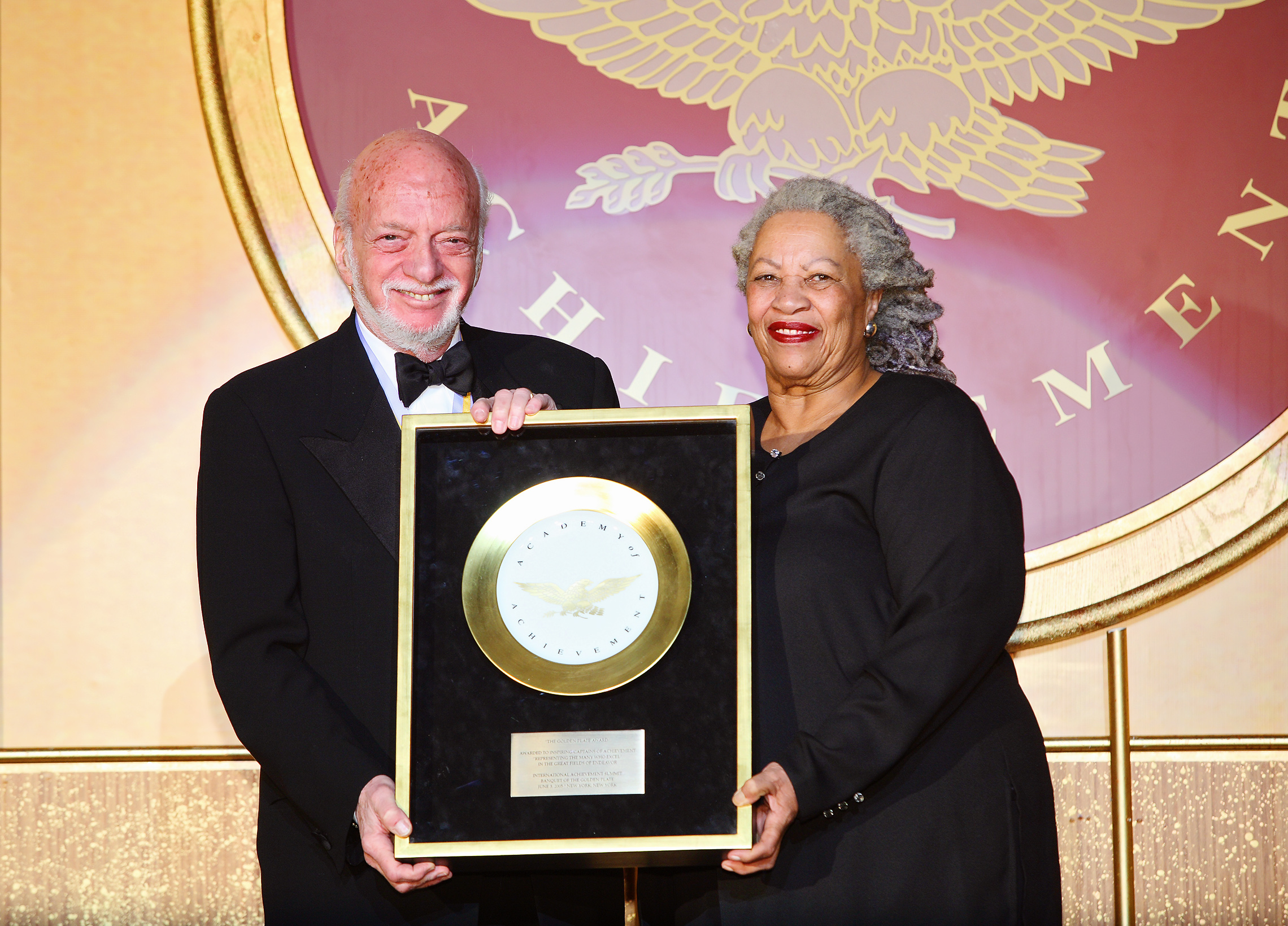
Legendary theatrical director Harold Prince discussed his extraordinary half-century career. The last speaker of the afternoon was the quarterback of the world champion Indianapolis Colts, Peyton Manning. Manning is not only a champion on the gridiron, but an exceptionally active philanthropist, who devotes his time away from the football field to an array of innovative charitable activities.
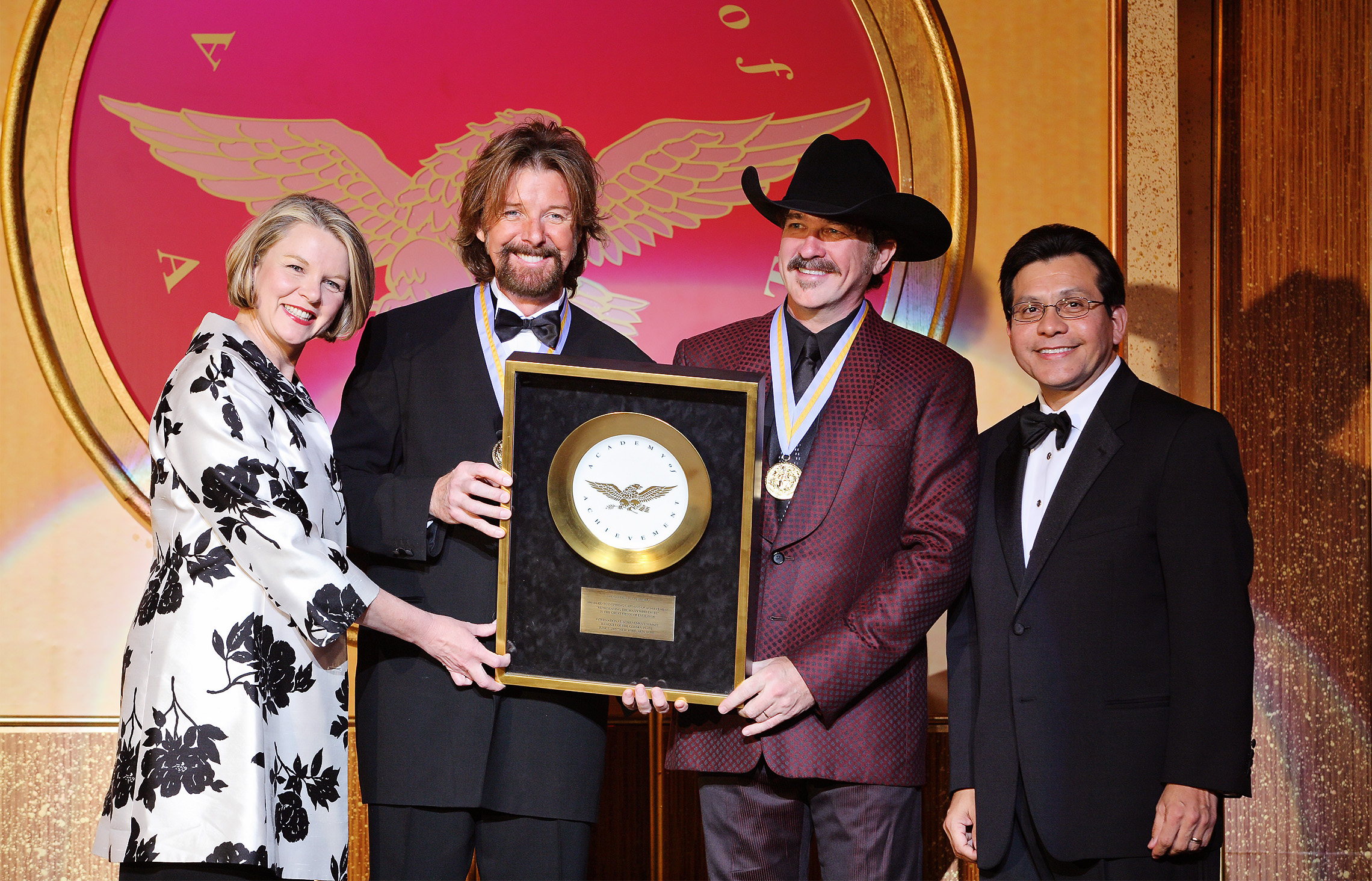
The 2007 International Achievement Summit culminated in the black-tie Banquet of the Golden Plate at the historic Mellon Auditorium, transformed for the occasion into a glittering banquet hall, brimming with flowers. The Academy’s Class of 2007 was inducted into the Academy, beginning with First Lady Laura Bush, who made a characteristically warm and gracious address, thanking the Summit’s host, Catherine B. Reynolds, and praising the accomplishments of a number of Academy student delegates, past and present, including Google founders Sergey Brin and Larry Page. Academy members and students enjoyed a splendid meal and shed the solemnity of some of the week’s more serious discussions to enjoy the rollicking music of Gretchen Wilson and Academy honorees Brooks and Dunn.
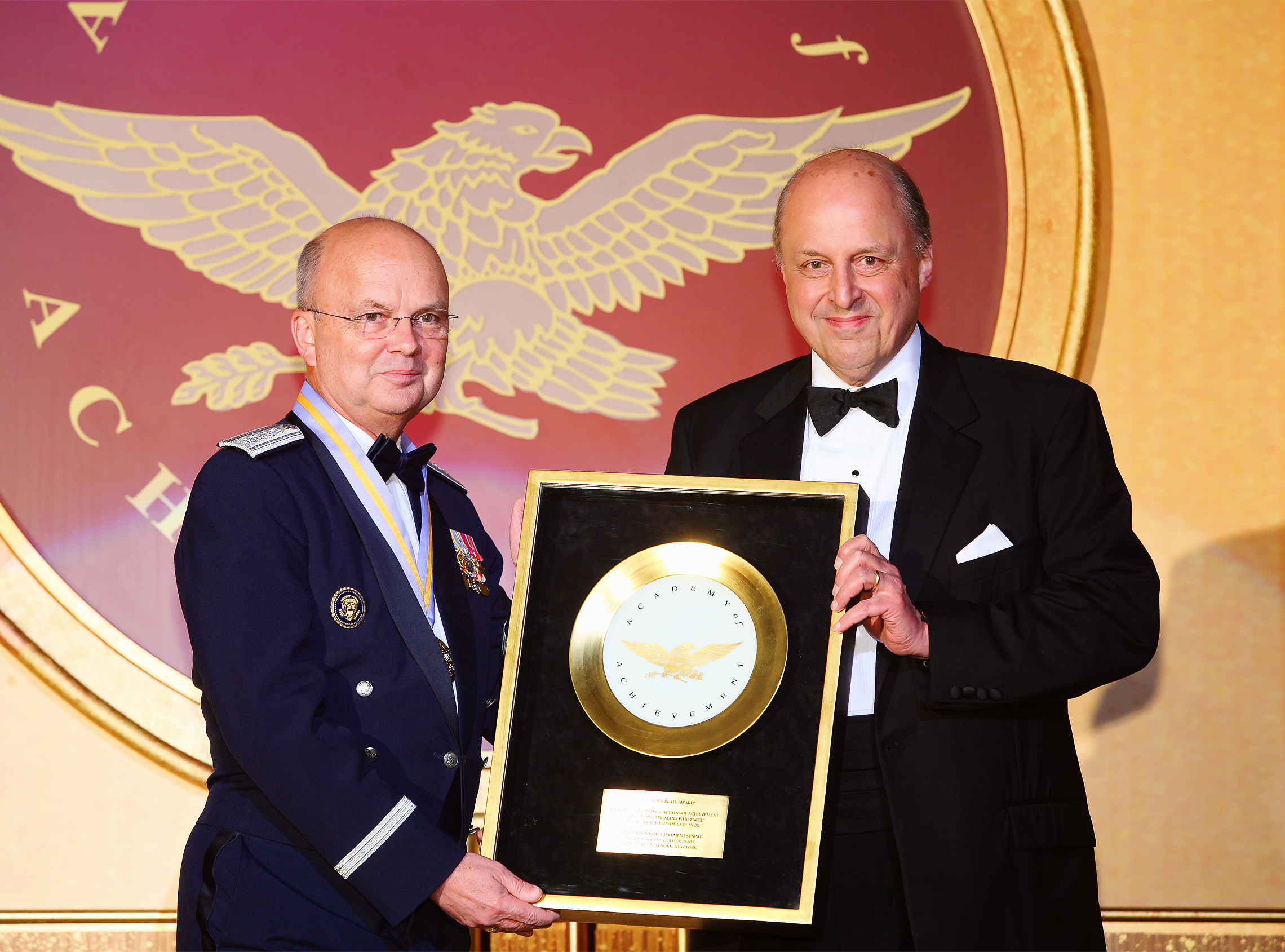
One might have wondered how an audience of serious young scholars, fresh from Oxford, Cambridge and the Ivy League, would respond to the uninhibited sounds of heartland America, but when Brooks and Dunn kicked into their signature song, “Boot Scootin’ Boogie,” students, statesmen, distinguished political commentators and Nobel Prize-winning scientists all took to the dance floor.

As speakers from Archbishop Tutu to President Clinton had reminded the assembly over the past week, human beings have far more in common than dictators and hate-mongers would have us believe. Opposing parties, different religions, half a hundred nations — all met on the dance floor at the Mellon Auditorium to celebrate the joy of living in a world of limitless opportunity. The following morning, Academy members and student delegates returned to their respective homes, fired with renewed inspiration to dedicate their own unique talents to the common cause of all humanity.
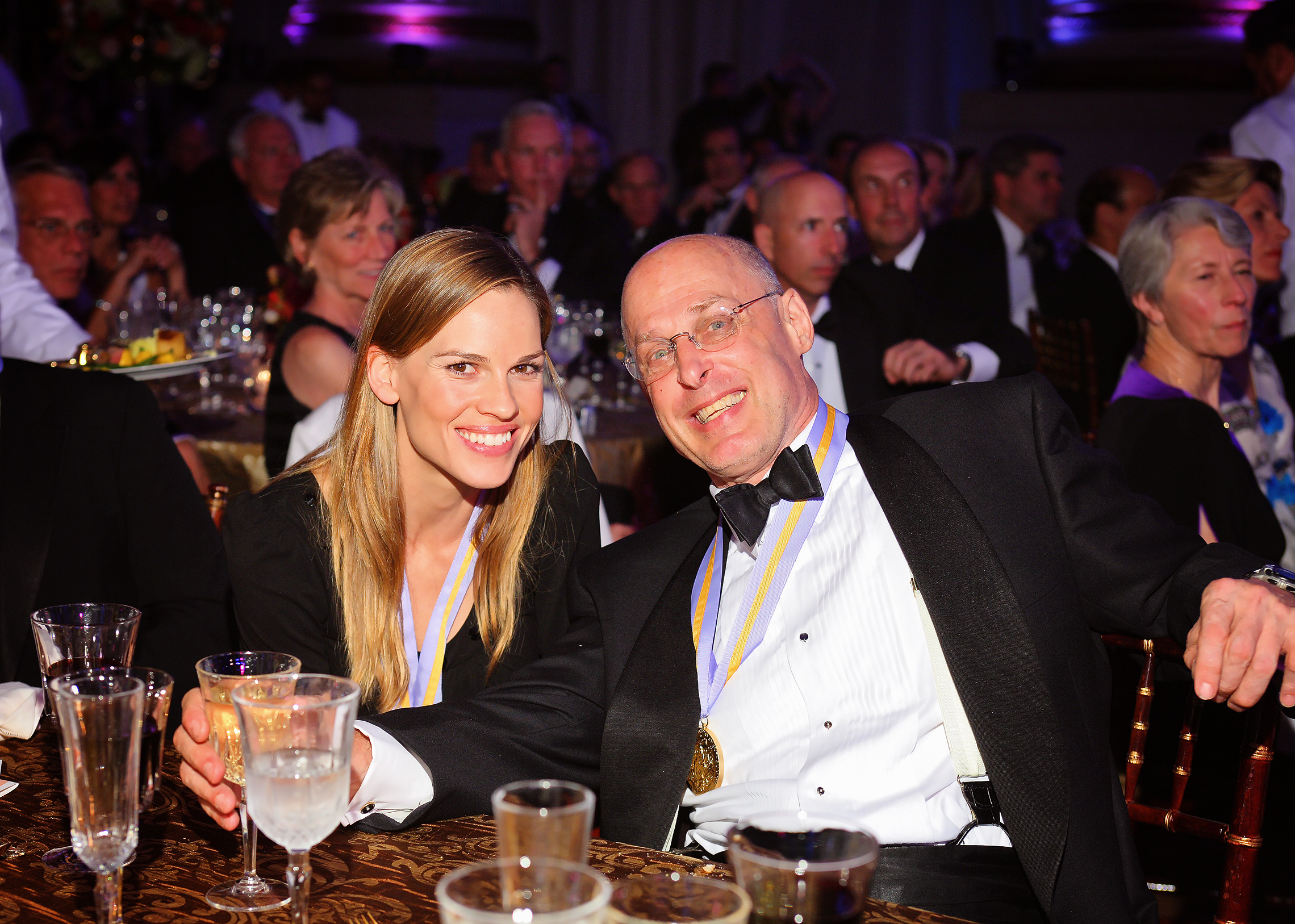
Senator Barack Obama addressed the Academy of Achievement at the Russell Senate Office Building during the 2007 International Achievement Summit, one year and nine months before he became the 44th President of the United States.

The heartfelt enthusiasm and genuine, unaffected gratitude of the student delegates are among the most rewarding aspects of the International Achievement Summit. We invite you to share in their close encounters with Academy members and fellow delegates, as described in their own words.
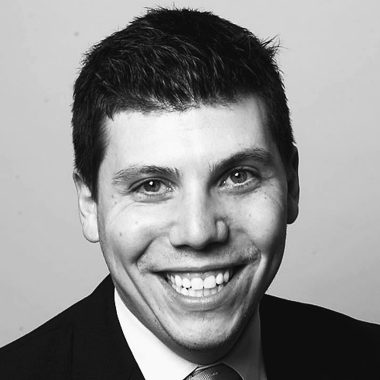
Brian A. Levine
Catherine B. Reynolds Foundation Fellow for Social Entrepreneurship, New York University School of Medicine
Dear Mrs. Reynolds,
Over the last eight months since the 2007 International Achievement Summit, I have undergone an unbelievably exciting transformation. My metamorphosis began with my participation in the inaugural class of the NYU Catherine B. Reynolds Foundation Graduate Fellowship in Social Entrepreneurship. Through this fellowship I had developed a strong desire to make a sustainable impact upon the world, but was unsure of how best to do that. I came to the Summit hoping to gain direction and better understand my potential.
While at the Summit, I took every opportunity to speak with fellow student attendees, interact with speakers, and most importantly, reflect upon each activity’s meaning and purpose. I had breakfast conversations about global health, lunch discussions about social innovations, and even received expert advice from Summit presenters such as Chris Matthews, Ralph Nader, David Gergen, Ed Markey and Ruth Bader Ginsburg, to name a few.
By the time I left the Summit, I was absolutely invigorated, and ready to act. Building upon the connections that I had made, I kept in touch with many of the participants and presenters, emailing them questions, honing my ideas, and refining my social entrepreneurial goals. Ultimately, I devised an ambitious project and felt equipped to move ahead.
The original idea was to create a website that would serve as a venue for online discussions of patient management and other academic discussions for physicians in Ghana. I went to Ghana in October 2007 and realized, after spending just a few days in Ghana, that the current technological infrastructure was unable to support the website that I had designed and that access to the internet was going to become a major impediment.
I had gone halfway around the world, and my project failed! However, taking into account everything that I learned at the Summit, I realized that most innovators fail multiple times, until they “get it right.”
As all the presenters advised, I took time to reevaluate my plan and strategy, and ultimately realized I needed to shift my approach. Instead of creating a website to serve as a communication tool, I could focus on creating communication with whatever tool was possible. And with that, this new project was born.
Having gained confidence from the Summit, I walked into the main offices of Ghana Telecom and asked to speak with the CEO of the mobile phone division (Onetouch). I explained to him my idea to market his cell phone company as the first company in the world to unify an entire country’s physician base on a single cell phone carrier. After two hours of lively discussion, he agreed and put a plan in writing. Within hours I was meeting with the General Secretary of the Ghana Medical Association, and later that week, I was overseeing a joint meeting between the Ghana Medical Association and Onetouch in which an innovative program was created.
Through this unique agreement, as of January 1, 2008, all registered Ghanaian physicians have the ability to call and SMS all other registered Ghanaian physicians free of charge, as well as dial a toll-free number from their Onetouch handset to speak with a live operator for other physicians’ contact information.
By having all of Ghana’s physicians on a unified network, information can freely flow from physician to physician, as well as from other agencies to physicians. In the event of an emergency or disaster, physicians can be easily sent an SMS, helping to save precious time when it counts most. In addition, physicians can call other physicians to refer patients to specialists, and then also follow up with that specialist after the care has been given. My hope is that Ghanaian physicians ultimately will no longer feel geographically isolated, regardless of where they practice, because another physician is now only a phone call away.
Because of the synergy between my experiences in the Reynolds Program in Social Entrepreneurship and those at the International Achievement Summit, I have begun a lifelong career of social entrepreneurship. When I started medical school, I never thought in my wildest dreams that I would be working in West Africa developing cell-phone based technologies for physicians. And now, less than a year after the Summit, as I am about to graduate in the first cohort of NYU Reynolds Fellows, I have learned first-hand about the limitless impact that each of us can have provided we are relentless in our pursuits.
Thank you for shaping me into the person I am today, and for putting me on the path of becoming one of the leaders of tomorrow.
Sincerely,
Brian A. Levine
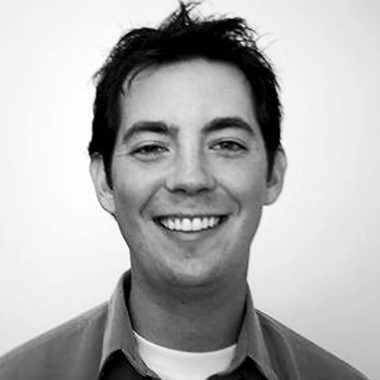
Thomas V. Johnson III
Gates Cambridge Scholar, Centre for Brain Repair, University of Cambridge
Dear Mrs. Reynolds,
I write this letter having just returned from the 46th annual International Achievement Summit in Washington, D.C. This is my first day back in the laboratory and I have spent all morning in an attempt to convey to my colleagues just how inspiring and influential the past week has been for me. As I recount the remarkable events that have taken place, everyone hearing my stories is absolutely astounded by my experiences at the Summit. And yet, I feel that I am barely able to adequately convey the importance that this Summit has had on my life. It is not simply the opportunity to meet extraordinary people nor to hear brilliant speeches that touched me most profoundly, but rather the emotions that have been stirred deep within that have really impacted my being.
As a neuroscientist and an aspiring physician, I was particularly taken aback by the time I was able to spend with the Academy’s honorees in the fields of science and medicine. Dr. Steven Rosenberg’s description of immuno-therapy for cancer would have been impressive in its own right, but introducing us to two of his patients undergoing the successful treatment regimen demonstrated how significant one’s touch on the world can be for individual people. I can’t help but think that perhaps this experience represents the essence of greatness — one betters the world as a whole by making positive impacts on the lives of individuals. At the Summit, I was impressed by Dr. Craig Mello’s presentation regarding his discovery of RNA interference. Being able to sit down and talk with him about the process of scientific discovery at a post-dinner reception, however, was an experience I’ll never forget. Dr. Mello advised me of the perseverance that one must exhibit to be successful in the field, but also described the excitement and amazing sense of satisfaction that arrives during that “Eureka” moment when you discover something new about the world that no one had ever known before.
This morning, I described to my lab mates the surreal experience of sitting in the courtroom of the Supreme Court of the United States of America as Chief Justice Roberts and Justices Ginsburg and Kennedy explained what it is like to serve at the highest level of the U.S. Judiciary. I recalled the time we spent in the Senate building listening to the inspiring words of Senators Reid, Obama, and Hagel. My friends were in awe as I told them of President Clinton’s speech and his candid responses to the subsequent question and answer session. I explained how each of these experiences painted real-life pictures of greatness and inspired the listeners to commit themselves to improving the world. Still, I am at a loss to fully describe the fire that was lit inside me as each of these amazing people called upon us student delegates to lead tomorrow’s world. I was so humbled and, at the same time, felt so empowered by the encouragement of today’s leaders.
I think that, for me, the most eye-opening aspect of the Summit was making the realization that all of these great people who have forever impacted the course of human civilization are but human themselves. We, as student delegates, have been afforded the opportunity to peer into the world of greatness. I was extremely humbled by the accomplishments of the Academy’s honorees, and yet I was most impressed by how down-to-earth and genuine they all were. True, having a conversation with Dr. Ben Carson was inspiring because he is an unspeakably talented neurosurgeon who has accomplished amazing things. What touched me more deeply, however, were his gifts of encouragement and the assertion that we could all affect the world to a similar extent. Indeed, my experience at this Summit was most inspiring not simply because I met great people, but because I was so strongly encouraged to pursue greatness myself. As such, this experience serves as an incredible source of motivation and inspiration to continue working for the betterment of society. As I return to my laboratory today, I feel the need to double my efforts in developing my skills to become a clinician-scientist, which will allow me to treat patients and touch individual lives and, in doing so, to improve the world as a whole.
In sum, my time at the International Achievement Summit has been one of the most absolutely inspiring and formative five days of my entire life. I feel humbled but also empowered to go forth and pursue great challenges in an effort to better our world. Of course, Mrs. Reynolds, l owe this experience and all of the consequential emotions and inspiration to you and your foundation. It is your generosity that has allowed me and the other student delegates to experience and understand greatness, and you have provided for each of us further motivation to achieve it ourselves.
I am certain that the world will continue to benefit from your kindness and vision. It is with my absolute sincerest gratitude that I wish to thank you for this extraordinary opportunity.
Sincerely yours,
Thomas V. Johnson III
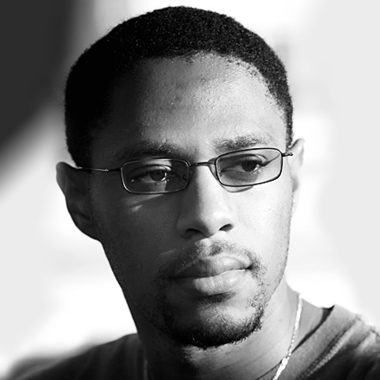
Keon West
Rhodes Scholar, Balliol College, Oxford University
Dear Mrs. Reynolds,
No letter could do justice to the impact that the 2007 International Academy of Achievement Summit in D.C. had on me. I had read about the Summit. I had read about the Golden Plate Awardees of previous years. I had even read the letters of thanks of other student delegates. Still, I was unprepared. As I boarded the flight out of D.C., I knew that I would never again be the same.
My fellow delegates were the first to drastically alter my worldview. My roommate, Syga Thomas, who had already lived, worked and volunteered in Cuba, Costa Rica and Japan, would spend his free time brushing up his seventh language — Portuguese. Serah Makka, who had worked in Afghanistan and planned to return to her home in Nigeria to encourage economic development, reminded me of the importance of going back to my own country. Everyone I spoke to filled me with wonder at the things that they achieved while still so young and often from such humble backgrounds. My own accomplishments were quickly put in perspective. I believed that in the first few hours I had used up all the awe I had.
I was terribly wrong. For within 24 hours my arm was around the shoulder of that great visionary and “Rabble-Rouser for Peace,” Archbishop Desmond Tutu. Shortly after, he delivered an address to the delegates calling us all to a new state of unity, love and understanding. To hear such a message from such a man was overwhelming.
I was nine years old when I first read the book Gifted Hands by Dr. Benjamin Carson. My whole life I have admired him for his insight into his country and his world, for his bravery in surmounting near-impossible odds, for his unshakable faith in God, and for his incredible humility in the face of so much achievement. Not only did I see him and hear him give quite possibly the most moving speech of the Summit, I was able to eat lunch with him and converse with him. Daily. Daily! We shared information about our mutual passions for changing systems of oppression in this world. I offered him my views of the books he had written. And he listened. And he responded!
Indeed, the mealtimes were every bit as inspiring as the presentations. They were the times when I could chat in French with Dr. Elias Zerhouni about French-Algerian relations.
Over breakfast, Dr. John C. Mather, a Nobel Prize-winner for his work on the Big Bang, explained his beliefs about God, physics and the creation of the universe to an eager table of delegates hungry for much more than waffles.
For one, brief, shining moment Hilary Swank and I had our arms around each other.
And there were several moments when I was simply stunned beyond words. Hearing the Supreme Court Judges explain in such eloquent simplicity the gravity of the Constitution of the United States of America, I saw that country, my country, all countries indeed, in a new way. Wisdom flowed out of them, pressed and distilled by 400 years of struggle for genuine independence. And listening to the wit, humor, and modesty of the Honorable Chuck Hagel reminded me of his humanity, and taught me in the clearest of ways, that great achievement is open to us all, even the most human amongst us. And the ground beneath my feet trembled when William Jefferson Clinton, the 42nd President of the most powerful country on Earth, looked me dead in the eyes to answer my question.
In what other place, and at what other time, could one hope to be in the company of such people? The Catherine B. Reynolds Foundation blew away the limitations of the universe I lived in and expanded my mind so ferociously that it took weeks to understand what had happened. Thank you so much, Mrs. Reynolds, for investing in me, and for opening the eyes of so many eager young people to a world they never dreamed possible. As long as I live I will treasure this time and this great gift you gave to all of us. A new me was born from this Summit, one refilled with hope, and awe, and inspiration. You encourage so many to make this world a better place, and for that we could never thank you enough.
With deepest gratitude,
Keon West
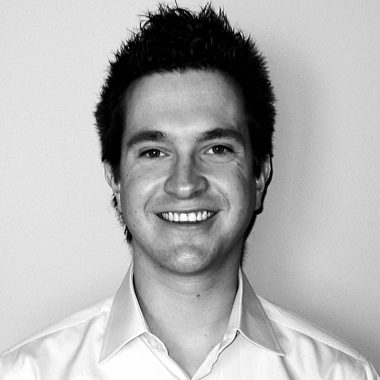
Mitchell R. Lunn
Howard Hughes Fellow, Stanford University School of Medicine
Dear Mrs. Reynolds,
From the depths of my being, I wish to extend my most heartfelt thanks for amazing experiences at the Academy of Achievement’s 2007 International Achievement Summit in Washington, D.C. Three weeks have passed since I returned to California, and I continue to be amazed at how much I took away from the Summit. Not a single day passes during which I do not recall the surreal encounters of those four days and, more importantly, the lessons imparted onto all delegates by the most amazing achievers in our society. Please permit me to share a few of my experiences with you.
As I continue to tell friends, family, and colleagues about the Summit, I frequently recount the discussion that several other delegates and I had with Ralph Nader and Prof. Marvin Minsky beginning at 12:30 AM at the beautiful Hay-Adams Hotel. Conversing and arguing about the democratic presidential candidates, we ended up being kicked out of the reception room so the hotel staff could go home. Continuing in the hotel lobby, Dr. Minsky and I discussed the fall of American newspaper sales due to a variety of factors including Internet distribution and poor marketing. We ended the evening (at 1:30 AM!) discussing Dr. Minsky’s area of artificial intelligence (AI), specifically how AI continues to fail with complex problem solving, and the current efforts in the field to classify problems so that AI can use the correct rule sets to solve them.
As a scientist and future physician, what a pleasure it was to see and meet such distinguished and inspiring figures as Drs. Benjamin Carson, John Mather, Ian Frazer, and Craig Mello. A group of my fellow scientists/physicians in training and I met Dr. Mello one evening; he recounted his discovery of RNA interference (RNAi) and when it became clear that RNAi was indeed something huge and revolutionary to science. Dr. Mello and I, as a virologist, discussed RNAi pathways in antiviral defenses and the future of harnessing RNAi to combat infection. His candor and easygoing attitude made it a true pleasure to learn about his stimulating career, his truly monumental discovery, and his life after the Nobel ceremony.
Sitting on the bus after dinner at the US Capitol, Dana Priest sat down next to me and posed the simple question, “What do you do?” The ensuing conversation centered on viruses — the two that I study, polio virus and dengue — and the threats of current and emerging infectious diseases including avian influenza and tuberculosis. Intimately familiar with the horrors at the Walter Reed Army Medical Center, Ms. Priest was no stranger to the effects of infection on human health. Our conversations continued during a reception the next evening with dialogue about her experiences inside Walter Reed, her career path, and her highly successful life in journalism. The importance of perseverance, a lesson iterated by many members of the Academy, was omnipresent in every aspect of her life, especially when she encouraged us to never lose sight of our goals.
Equally as interesting as all the members of the Academy were the amazing students from across the world. Over the course of the Summit, I met many inspiring colleagues from Boston to Russia and from England to the San Francisco Bay area. Paired with an Aussie roommate, we discussed the announcement of Dr. Ian Frazer as “Australian of the Year.” A physician and Ph.D. student, my roommate was utterly pleased that (finally!) a scientist was given this honor instead of a sports figure. Upon hearing Dr. Frazer speak at the National Archives, it was clear that his development of the human papilloma virus (HPV) vaccine has the capability to have one of the largest impacts on human health in the next 50 years. The Summit spawned several new friendships including one friend that I will be visiting when passing through Minneapolis in early August. Excitingly, the Summit also enabled me to reconnect with an old friend and colleague with whom I used to work at Columbia University.
At the end of those fabulous days, I left feeling a bit confused: Should I rekindle my dream to write a book? Should I work to end health disparities in the lesbian, gay, bisexual, and transgender community? Should I affect health policy through leadership in government and non-government organizations? While I expect to do all of those during my career, one thing was lucid and resonated with every single student delegate: we all have the ability and the unquestionable responsibility to make a difference in our world. As Elie Wiesel said, “The worst sin is to be a spectator… There is ‘response’ in responsibility.” In order to do so, we must get over our fear of failure — a fear that we all agreed is strongly present. Hilary Swank told us, “The greatest obstacle in life is yourself,” and President Bill Clinton drove that point home when he said, “The failure to try will deaden your life.”
Sitting here in Palo Alto, my mind races with things I must do during my life to continue to affect positive change for society. The Academy of Achievement’s International Achievement Summit has catapulted me into a novel state of mind. The inspiration received and contacts made will carry me forward with humility to pursue my passion while serving humankind for my entire life. Thank you again for bestowing upon me the honor to attend this amazing event, and I hope that our paths will cross again soon.
Mitchell R. Lunn
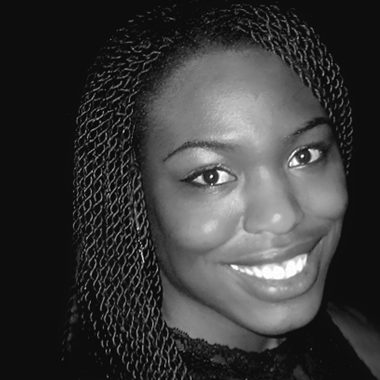
Obianuju Jennifer Obi
Susan J. Blumenthal Scholar, Harvard Medical School
Dear Mrs. Reynolds,
I wish to express my heartfelt gratitude for providing me with the opportunity to attend the 2007 International Achievement Summit in Washington, DC. A simple “thank you” seems too trite, so I apologize in advance for the length of this letter. It was truly an eye-opening experience — one that will forever be etched in my mind and my spirit. I had no idea what to expect when Admiral Susan Blumenthal, a wonderful mentor and role model, nominated me to attend as her delegate. I am honored and gratified that she did, for I left with intense feelings of inspiration, energy, and reaffirmation.
My inspiration stemmed from meeting and interacting with the brilliant minds of today’s world community. Each and every single day, I saw and heard a group of educated, talented, and diverse achievers talk about their journeys of success and failures as well as their passions. I felt honored and humbled at the same time, for I never could have imagined being able to listen to Bill Clinton, Barack Obama, Archbishop Desmond Tutu, Elie Wiesel, and others speak to me with such candor and vigor.
Mrs. Rosenberg, the wife of Dr. Steven Rosenberg, Director of the NIH Cancer Institute, noticed that I was in awe of so many important people and whispered to me: “Don’t worry. They are just people too.”
It gave me the encouragement to approach Ralph Nader and engage him in a debate on healthcare reform as well as with Warner Brothers producer Kevin McCormick about “blood diamonds” in Sierra Leone.
Additionally, I felt so energized by the superb speakers — they just exuded confidence, passion, and sincerity. Suzan-Lori Parks, for example, while standing on one leg like a flamingo, offered advice such as to “practice radical inclusion.” This message compelled me to move beyond my comfort zone to engage with fellow delegates about methods of rebuilding the community of New Orleans or about immigration reform.
Additionally, Thomas Friedman remarked that “If it’s not being done, it’s because you are not doing it.” This comment, when combined with Congressman Ed Markey’s charge to us, “You are the green generation — you have the science, technology — now add to it the commitment to protect our planet,” and Richard Leakey’s words, “It doesn’t matter whose fault it is; it only matters if we can do something about it,” left me feeling particularly revitalized to take those chances and leaps to explore other opportunities — talk to people whom I would not dare dream of talking to — Nobel Prize winner Dr. Mello, director George Lucas, publisher Phyllis Grann and many more!
Additionally, another event that energized me was during the Friday evening Gala when Kix Brooks from Brooks and Dunn jumped off the stage during one of their soul-jarring and body-moving songs to grab my hand and proceed to twirl me around. I could not stop smiling about it afterwards — when can I ever say that I danced with a music legend? The whole entire night was amazing, with people dancing left and right — Gold Medal winners with student delegates!
More importantly, I came away from this conference feeling reaffirmed about my future aspirations. Working with Dr. Blumenthal in her capacity as Assistant Surgeon General of the United States, a champion for women’s and global health, has been instrumental in me realizing my goals and encouraging me to work at the interface of public health, human rights, and social well-being. Making it possible for me to attend this conference is just another example of her commitment — allowing me to see that I am not alone in wanting to bring about real, sustainable change in our country and world. Throughout the conference, I noticed that many of my fellow student delegates expressed similar values of bringing about world change. The concept that there are never enough hours in the day became readily apparent during the four-day conference when I often found myself crawling into bed around 3 a.m. after talking, debating, and laughing with my peers. Hailing from diverse backgrounds (from India to South Africa; from education to business; from liberal to conservative) only added to the richness of our conversations. This feeling of reaffirmation was further solidified on Saturday morning when Mrs. Carson (the wife of Ben Carson) remarked to me and three other students that we “are the future — the talented bunch.” I am confident in Mrs. Carson’s words, for I can foresee myself and fellow peers becoming lifelong partners in the mission for change and opportunity for all.
As you can see, Mrs. Reynolds, I thoroughly enjoyed myself and feel very fortunate to have had the opportunity to attend. Your work and the mission of your organizations and the staff of the Academy of Achievement behind the scenes made the event so memorable and the experiences so diverse, allowing the student delegates to immerse themselves in the brilliant creativity of the Academy members and Academy’s vision that individuals and education can change the world. Thank you again for this extraordinary opportunity — it came at an important time in my life, providing me with great inspiration, energy and reaffirmation to make a lasting difference in my community, country and the world.
Obianuju Jennifer Obi
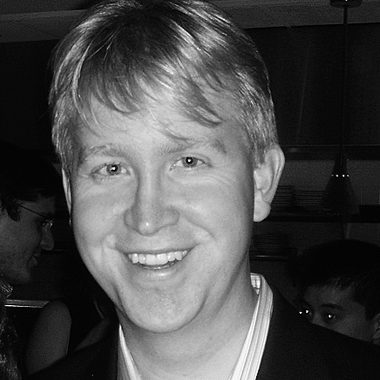
Matthew J. Spence
Marshall Scholar, Oxford University and Yale Law School
Dear Mrs. Reynolds,
I have just returned home from the International Achievement Summit and I cannot stop talking about it with everyone at home. I wanted to write you immediately with my enormous thanks for making it possible for me to attend.
The experience is still surreal. How do you explain a week having drinks with Chris Matthews and Ralph Nader one night, while spending the next talking with Hilary Swank about what lessons President Clinton shared in the two hours he spent with us? Of the many things for which I have to thank you, what stands out are two gifts this past week gave me: some uncommon wisdom from our notable speakers about how they navigated some of the career choices I am facing now, and new friendships with the other student delegates that I know will be lasting. For all of this, thank you.
One of the most memorable elements of the Summit was the personal stories of struggle that some of the speakers shared with us. President Clinton’s wisdom, in particular, stood out. “Everyone suffers personal attacks in politics,” President Clinton told us. “And as I’ve gotten older. I’ve become better at understanding the difference between what I can control and what I cannot.” What President Clinton said mattered most was how someone attacks you, since in politics and public life anyone who tries to do something of meaning will be attacked: “Ninety percent of an attack,” he told us, “is how you respond.” President Clinton shared an insight Nelson Mandela gave him: “I was talking with him once, and I said, ‘Nelson, I know how courageous it was to invite your former jailors to your inauguration and to invite former members of the apartheid government to join your cabinet. But, between you and me, you know it’s also good politics. Didn’t you still just hate them?'” Clinton said that Mandela told him that for the first eleven years he was in prison he indeed did hate his jailor. But, at some point after that, President Clinton said Mandela told him, “I saw they had taken everything from me. They controlled my life. They beat me. They stopped me from seeing my children grow up. They caused the breakup of my marriage. And I realized at one point that the only thing they could not take from me was my heart and my mind. I could still control that. They could not make me hate them. I still had the power to choose how to respond and I did.”
Clinton paused and said, “Then Nelson stopped and pointed his finger at me — and this was in the middle of my impeachment — and he said, “Now you remember this.”
I have heard President Clinton speak countless times before — on television, and even in person. But I never expected to hear these personal lessons and stories from him. I could continue on for pages about more of the same. Woodrow Wilson’s biographer described President Wilson’s lessons of following your passion to success rather than some forty-year plan you hatched when you graduated from college. Andre Agassi described how he returned to win the French Open just weeks after his divorce. Being in the same room, sharing the struggles and wisdom with those who have achieved beyond what anyone could have expected of them, was a rare opportunity. I cannot thank you enough for making that possible for me.
One of my other most treasured parts of this week are the new friendships with the other student delegates. There is something unique to take all of us away from our daily routines of school, jobs, and endless setting of goals — and to bring us together to reflect. That shared experience creates friendships over days and hours that would in any other place take years to form. My roommate founded a growing Internet startup company. A new friend from Los Angeles is working on global health. Another is publishing path-breaking work on understanding ethnic conflict and civil wars. The emails are already flying between us, and we’re talking about where to meet next. Our shared experience of this past week has already formed an uncommon bond among many of us, and I am still amazed and inspired by those I met. The best part is that I know it is just the beginning.
I could go on for much longer about this unique and unforgettable experience you gave me in Washington this past week. As I begin my clerkship for Judge Posner next year after my first year of practicing law, I know the choices in my career and personal life that are quickly coming ahead. As I think about this, the lessons and friendships from the International Academy of Achievement Summit will be among the first thoughts that come to mind.
For all of that and more, I am deeply grateful to you. Your generous sponsorship of my attendance at the week made all of this possible for me. I am humbled by the experience and tremendously thankful for your support. I know this week was just the beginning of joining this amazing community. I look forward to seeing you again, and hope someday to give back in some measure what you so generously gave me last week.
Sincerely,
Matthew J. Spence
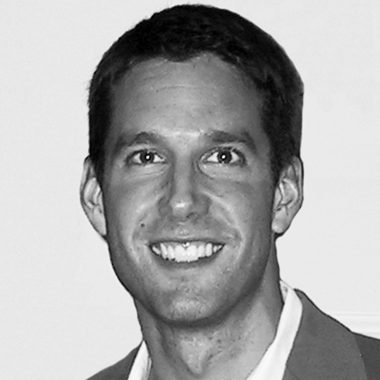
Karsten DaPonte
Paul H. Nitze School of Advanced International Studies, Johns Hopkins University
Dear Mrs. Reynolds,
Just one week after the Academy of Achievement’s International Summit, I am still in awe of the experience in which I was a very fortunate participant. Looking back, to prior to the event, I wasn’t able to tell my friends or family what I was in for… and I couldn’t ever have predicted that it would be as fulfilling or inspiring as it ultimately was. Thank you!!!
Not knowing too much about the Academy of Achievement, my understanding of the purpose of the event developed a bit over the first day or two. It was actually Suzan-Lori Parks who put it in the clearest terms, from my perspective… The comment that struck me most was her statement that the types of awards, accolades and achievements to which many of us (student delegates and honorees) could become quite accustomed come with a fine print: that these honors come with the responsibility to lead and act in a manner which brings credit to your country, trade, and passions — all in pursuit of helping others and bringing about positive change in the world.
The gathering of guests, speakers, facilitators, and honorees was inspirational to say the least.
My fellow student delegates and I felt that we were being engaged by these amazing people as peers to work together towards improving our world.
The topics were relevant and important. I’ll close this brief thank you (the length couldn’t possibly match my level of appreciation…) with a final recognition of another valuable message that came through to me loud and clear — from President Clinton, during his extended remarks. His charge to the students to resist the temptation of focusing on our achievements, but instead to pay close attention to the divides in this world: from those of great fortune, to those of much less… from those benefiting from outstanding education, to those receiving spare resources… from those enjoying great health and substantial nourishment, to those living day by day…
By recognizing these divides, we take the first step towards making a better world.
Thank you again for my inclusion in this wonderful event.
Sincerely,
Karsten DaPonte
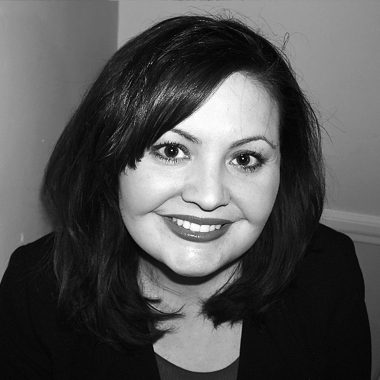
Leslie A. Boozer
Zuckerman Fellow, Graduate School of Education, Harvard University
Dear Mrs. Reynolds,
I am writing to express my sincere gratitude for providing me with the opportunity to attend the 2007 International Achievement Summit in Washington, D.C. While I have been blessed to attend several amazing conferences over the years, this week will truly be remembered as the most inspiring and incredible learning experience of my life. I will forever be grateful to you, your husband Wayne, and the terrific staff for coordinating such a well-organized and intellectually stimulating event.
As you mentioned during your opening remarks, one of the primary purposes of the Academy of Achievement is to inspire us. After listening to the words of some of the most influential and distinguished leaders of our time, it would have been impossible to not be motivated. This diverse group of people, from President Bill Clinton to acclaimed author Toni Morrison, encouraged us to dream, to explore, and to reach beyond our comfort zone to achieve great things in our lifetime.
While working as an urban educator, I have learned that one of the best ways to encourage young people to achieve is to lead by example. I was delighted by the large number of achievers who stressed the importance of education in reaching their success, as well as their desire to improve the education of our country’s youth. From learning about Andre Agassi’s award-winning K-12 school in Las Vegas to discussing the efforts of the Milken schools with Michael Milken, I was inspired by so many of the achievers’ dedication to improving the lives of our most disadvantaged youth. Following their talks, many of the student delegates inquired about our public education system and how educational leaders are working to improve our schools. By highlighting this dilemma, I am hopeful for a cross-discipline solution in the future.
What was particularly remarkable about this year’s Summit was the collection of students from all over the world. Not only was I privileged to hear firsthand of the sacrifice and hardship endured by two of my heroes — Elie Wiesel and Archbishop Desmond Tutu — but I also was privileged to meet and learn from my roommate, Arezo Kohistani from Afghanistan. Hearing her struggle to improve policy and achieve peace in her country was equally inspiring.
In all, the Summit can only be described as overwhelming. Thank you again for bringing all of us together to this amazing event. I sincerely hope the Academy of Achievement’s annual International Achievement Summit will continue for generations to come so that many other achievers and students will be afforded the opportunity to learn from each other.
With deepest gratitude,
Leslie A. Boozer
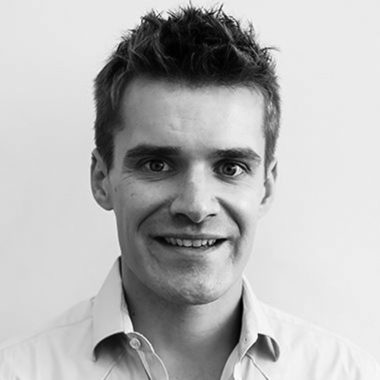
Brian Capell
Francis Collins Scholar, New York University School of Medicine
Dear Mrs. Reynolds,
I would like to extend my most sincere thanks and gratitude to you for allowing me the opportunity to attend the 2007 Summit of the International Academy of Achievement. It is hard to put into words what a rich and moving experience it was. Having lived in D.C. for the last three years, and having to move back to New York at the end of this summer, I felt very privileged to experience such phenomenal moments in the Capitol, the Supreme Court, the Senate and House, the National Archives, the State Department, etc. It definitely was the ultimate capstone to my time here. Below I would like to touch on a few of the most important moments of the Summit for me.
Beginning the very first night, to file past the Vietnam Memorial, sit before the Lincoln Memorial, and hear General Wesley Clark’s perspective on the lessons he has learned and how he would have handled both Vietnam and Iraq differently, was extremely illuminating and reaffirmed many of my own beliefs of what the role of the U.S. should be in this world as well as what a tremendous difference individual leaders can make, both for better and for worse.
The following day at the National Archives, I took very seriously David Rubenstein’s message of being persistent, finding one’s niche where they can make the greatest difference, and most importantly, being absolutely resolute to not settle or coast on one’s early successes. Rather, we must always push ourselves to be better and to keep achieving, lest others will pass us by and we will miss the opportunity to truly change the world in a more meaningful way.
As a future physician-scientist, it was an incredible thrill that evening to speak informally with both Craig Mello and Brian Druker. Beyond just the opportunity to see how down-to-earth both were, to discover how both were so driven by an urge to go above and beyond their already phenomenal scientific accomplishments in order to try and do something for the world’s larger problems made me realize that one must think bigger and not limit oneself. It was very gratifying to see that despite such success their true motivation remained the fundamental urge to help others, precisely why I always wanted to go into medicine.
The sensory overload continued during the session at the State Department where Dana Priest, in her uncovering the atrocious conditions of care at Walter Reed Army Medical Center, embodied the ability of an individual to enact major change at even the highest levels of government. Nothing that day, however, could compare to the words of Archbishop Desmond Tutu. Weaving together humor and his own experiences, Archbishop Tutu presented fascinating cases of how young people throughout the world have been the instruments of major change throughout history. From the end of Vietnam to the end of Apartheid, the Archbishop left no doubt that it is people just like us, his audience, that are needed to bring change and solutions to the great issues and injustices in our world today. His vision of “bla
